March 2023
How Technology Can Help with Virtual Showings and Renting Apartments

Can a Landlord Put Professional Cleaning Fees in a Lease?
Would Boston Mayor Wu’s Rent Control Proposal Help or Hinder Housing?

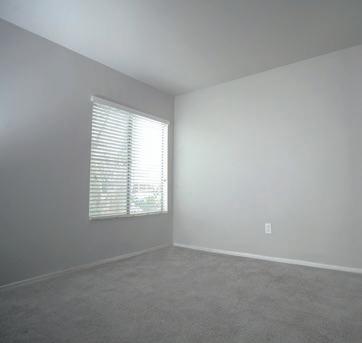
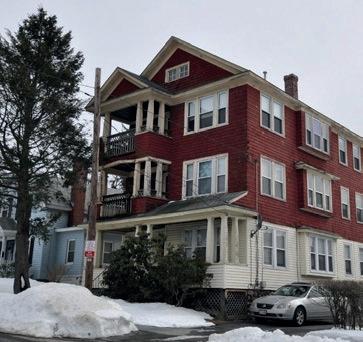
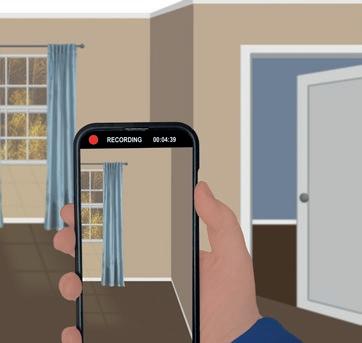
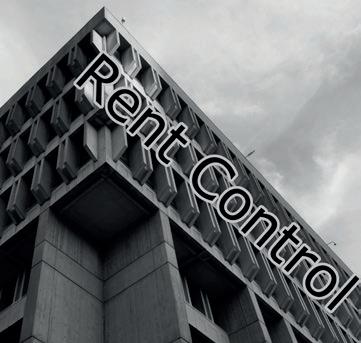
2 MASSLANDLORDS IS FUNDED PRIMARILY BY MEMBERSHIP DUES. THANK YOU FOR YOUR SUPPORT. Contents 4 3 Thank Members and Property Rights Supporters 4 Would Boston Mayor Wu’s Rent Control Proposal Help or Hinder Housing? 10 How Do Rent Control Boards Benefit the Wealthy and Well Connected? 14 How Technology Can Help with Virtual Showings and Renting Apartments 16 Can a Landlord Put Professional Cleaning Fees in a Lease? 19 MassLandlords Testimony Against Boston Rent Control Docket #0408 20 Why Was Cambridge’s Rent Control Racist? Why Would Boston’s Be the Same? 22 An Open Letter to Boston City Council about Rent Control and G.L. Chapter 40P 24 Do IRA Tax Incentives and Rebates Apply to Rental Properties? 27 REGIONAL 14 16 24 19
Published by MassLandlords, 14th Floor, One Broadway, cambridge, Ma 02142.
The largest non-profit for Massachusetts landlords. We help you own, rent or manage. We create better rental housing.
info@masslandlords.net
774-314-1896
THE MASSLANDLORDS
BOARD OF DIRECTORS
rich Merlino, President, through 2022
alec Bewsee, Treasurer, through 2023
Michele Kasabula, Secretary, through 2024
Steffen Landrum, through 2025
Patrick Sullivan, through 2026
EXECUTIVE DIRECTOR
Douglas Quattrochi
INFORMATION MANAGER
Jillian campayno
COMMUNITY BUILDER AND ACCOUNTANT
Naomi richardson
WRITER, JOURNALIST, AND EDITOR
Kimberly harper rau, Eric Weld
FULL STACK DEVELOPER

ron Software Development Services
LEGISLATIVE AFFAIRS COUNSEL
Peter Vickery, Esq.
SR MANAGER OF SERVICE AND MARKETING
Sue McMahon
BOOKKEEPING
Vipan Garg, honeylyn Estopace
MANAGER OF ADVERTISING DESIGN AND PLACEMENT
Paul Ssemanda
MESSAGE BOARDS, SERVICE DIRECTORY, AND DATA
Fatima cangas, Nomer caceres, Emerson raniaga, Maria Evangeline Legaspi
VIRTUAL REGISTRATION DESK
Naomi Elliott, Kaitlin McMahon
NEWSLETTER DESIGN
ailar arak
VIDEOGRAPHY
Paul Mong
TRANSCRIPTION
Prospero Pulma
PHOTOGRAPHY
Barry collins, Paul Shea
SPANISH TRANSLATION
Paola hernández, Stuart carter
CAMBRIDGE RECORD SCANNER
Linda Levine
EVICTION DATA RESEARCHER
arjun Shanmugam
CHARLES RIVER VOLUNTEERS
charles O’Neill, Paul harris
PARTNER ASSOCIATIONS
MWPOA Frank hays and team
SWCLA Mark Marzeotti and team
NWCLA Brian Lucier and team
RHABC Jim Stockley III and team
MassLandlords’ views and opinions may not reflect those of partner associations. With Immense Gratitude to Seven Decades of Past Volunteers
For pay-as-you-go business advice or legal information, visit MassLandlords.net/helpline cover Photo by massmatt, cc BY 2.0 https://flickr.com/photos/ momentsnotice/47971793157/
LETTER FROM THE EXECUTIVE DIRECTOR
Thank Members and Property Rights Supporters
Our Letter from the Executive Director for March 2023 looks back on a policyfilled February.
In February, we worked extremely hard to educate and oppose in the debate over Boston’s rent control proposal. But the policy news isn’t all bad. We now have a lot of co-sponsors on our deleading bill. Thank goodness for our long-time members, and also for members who donate extra for property rights support, who make this possible.
As we’ve detailed in this edition, the mayor of Boston has filed a proposal for rent control. In a nutshell, it means second-generation rent control boards unlike the objective system used in Oregon. It also means eviction restrictions.
It’s a “bootleggers and Baptists” moment, as Legislative Affairs Counsel Peter Vickery described to members at our Feb. 21 policy event. On the one hand, we have the progressive left working toward rent control to Band-Aid the housing crisis. Like the Baptists of the Prohibition era, they’re supporting it because they believe in it. Then, on the other hand, we have the developers supporting rent control because they live on tear-downs. Like the bootleggers of Prohibition, they’re supporting it because they see opportunity in a regulated market. Also, might I mention, their tremendous splashing around of campaign donations seems to have granted developers massive exemptions in the proposed rent control scheme.
I would have preferred not to be opposing either group. We’re in total agreement with progressives that no one should be homeless. That’s why we’re suing the state over rental assistance. And we’re in total agreement that we need greater freedom to knock down and rebuild. That’s why we’ve consistently advocated for zoning reform.
Unfortunately on this matter, the mayor was ill advised not to invite us or any other residential landlord to her advisory committee. The plan that she allowed to be produced is assailable from multiple perspectives. And indeed, at the City Council committee hearing on Feb. 22, it was.
At our board meeting on Feb. 22, the Board of Directors voted unanimously to litigate against the City of Boston for access to public records. We know there was influence peddling. We want to see who, where and how much. This shows we’re miffed. It’s also a prelude to a challenge under the Civil Rights Act of 1968. Rent control has wicked disparate impact, as we discuss in this edition as well.
Meanwhile our deleading bill awaits committee assignment. To the great credit of a lot of members, and MassLandlords staff, we now have 16 co-sponsors for 193 HD.2630 and 12 co-sponsors in the Senate for 193 SD.862. These bills would increase our deleading credit to $15,000 per unit.
MassLandlords’ work benefits owners, managers and service providers of rental housing across the industry. Please join as a member, become a property rights supporter or increase your level of support.
Sincerely,
Douglas Quattrochi Executive Director, MassLandlords, Inc.
Point
3 March 2023 MASSLANDLORDS IS FUNDED PRIMARILY BY MEMBERSHIP DUES. THANK YOU FOR YOUR SUPPORT.
your camera app here to read more online.
Would Boston Mayor Wu’s Rent Control Proposal Help or Hinder Housing?
By Eric Weld, MassLandlords, Inc.
Boston Mayor Wu’s recently published rent control proposal features some distinctions from past failed policies, but would it fare any better?
Boston Mayor Michelle Wu’s rent control plan, which was recently published upon submission to the Boston City Council, contains few surprises and retraces policies from the past. Before it was published, some details of Mayor Wu’s plan were “leaked” and reported by
numerous media outlets. We look at some of the plan’s details below.
The proposal, which emerged from her mysteriously appointed Rent Stabilization Advisory Committee, attempts some distinctions from failed Boston and Cambridge rent control policies of the 1970s and 1980s. Those distinctions would not likely deter the ultimate failure of this plan, either.
Mayor Wu, who assumed office in November 2021, campaigned on a promise to tackle Boston’s housing crisis. Her pledge partly entailed policies that would aim to incentivize more housing development, but also included a return
to rent control, which she calls “rent stabilization,” as a way to help renters. (A considerable amount of data from studies since the state banned rent control in 1994 refutes that premise. The majority of statistics on rent control show that such policies, contrary to helping, hinder low- and middle-income renters’ ability to find affordable housing.)
The mayor has quickly acted on her campaign promise. She formed a Rent Stabilization Advisory Committee last year to study the possibilities and connotations of rent control in Boston. We remain uncertain of how the committee membership was decided, and it has no representation from small-business housing providers. (At the time of writing, litigation had been drafted and presented to the MassLandlords board for a vote on whether to sue for public information disclosure regarding RSAC membership.)
RENT RESTRICTIONS AND FAIR RETURN
Most prominently, Mayor Wu’s plan would install a cap on rent increases throughout her Boston jurisdiction. Applying such a cap renders rental properties under rent-control regulated businesses, similar to utilities, and the issue of “fair rate of return” on investment enters the equation.
On paper, landlords would be allowed to raise rents no more than 6% above the Consumer Price Index (CPI), which is used to measure inflation, year to year, with a hard cap of 10%.

March 2023 4 MASSLANDLORDS NEWSLETTER
BY MEMBERSHIP DUES. THANK YOU FOR YOUR SUPPORT.
MASSLANDLORDS IS FUNDED PRIMARILY
Boston City Hall, at 1 City Hall Square, home to the office of Boston Mayor Michelle Wu. Image: CC BY-SA Daderot, Wikimedia Commons.
CAMBRIDGE SAGE
#1 Landlord-specialist Realtor in Cambridge, Somerville and surrounding towns
#1 Landlord-specialist Realtor in Cambridge, Somerville and surrounding towns

Deep expertise in multi-family sales, purchases and rentals in Cambridge, Somerville and Medford
Deep expertise in multi-family sales, purchases and rentals in Cambridge, Somerville and Medford
FREE property valuations
FREE property valuations
FREE leasing services - only tenants pay broker fee
FREE leasing services - only tenants pay broker fee
FREE lease renewal services for existing clients
FREE lease renewal services for existing clients
FREE property upgrade consults
FREE property upgrade consults
FREE rental pricing recommendations
FREE rental pricing recommendations
FREE vendor recommendations for handymen, cleaners, snow removal and more
FREE vendor recommendations for handymen, cleaners, snow removal and more
No commitments or contracts for rentals
No commitments or contracts for rentals
CALL TODAY FOR YOUR FREE CONSULTATION WITH CAMBRIDGE SAGE:
CALL TODAY FOR YOUR FREE CONSULTATION WITH CAMBRIDGE SAGE:

617-833-7457
617-833-7457
However, a property with excess profitability could be denied rent increases entirely under the so-called “fair return” standard being proposed. There is no detail in the proposal for what a fair return might be or who should decide.
Massachusetts’ past rent control is littered with examples of landlords being denied rent increases by rent control boards.
SAGE@CAMBRIDGESAGE.COM
SAGE@CAMBRIDGESAGE.COM
several) notes about New York City. Upkeep and renovation costs money. Without it, as when property owners’ income is artificially restricted to very little or no return on investment, improvements and even regular maintenance slow down or cease.


It’s also not hard to correlate a precipitous drop in housing investment as a result of such a rent-control policy.
RENT CONTROL EXEMPTIONS

Cambridge, for example, excluded mortgage payments from operating expenses and lumped legal fees into a set management allowance. Under this “fair return” standard, it was impossible for landlords to get rent increases for interest rate changes or evictions.
QUALITY DECLINE








Without a fair rate of return on investment, housing quality inevitably declines. Without revenue, rental property owners would have no means with which to maintain and upgrade their rental units.
It’s widely agreed that rental housing under rent control suffers from long-term deterioration, as one study (among
Already, new housing construction in Greater Boston is seeing a decline, with further drops anticipated. Cities and towns in and around Boston permitted 12% fewer housing units from 2021 (a year of high permitting), the largest decline in the city since the Great Recession. Some of that reduction can be blamed on higher costs, but anticipation of changes in Boston’s rental housing policy have also made a negative impact. An investor would obviously prefer to invest in housing in communities or projects, such as condominiums, that wouldn’t restrict ROI – potentially into negative territory – through policy.
Mayor Wu’s proposal seeks to alleviate housing production concerns. It would exempt new buildings for the first 15 years after being constructed, including housing built in the past 15 years. (We previously erred in reporting that this exemption was omitted. A bullet point at the bottom of page one had been dropped from the scanned version we had been given.)
The proposal would also exempt owner-occupied rental buildings with six or fewer units, as well as the following: temporary rentals such as hotels; dwelling units in nonprofits like hospitals and elderly housing; dormitories; public housing; and rentals that accommodate tenants on voucher programs.
The plan would also not apply between tenants. When a lease ends and a tenant moves out, an increase in rent on the lease for a new tenant would be unrestricted.
Alongside rent increase restrictions, the mayor’s proposal would also enact a “just cause” eviction mandate. This would
5 MASSLANDLORDS IS FUNDED PRIMARILY BY MEMBERSHIP DUES. THANK YOU FOR YOUR SUPPORT.
OVER 100 ALL 5-STAR GOOGLE REVIEWS
allegedly disallow evictions without good reason, such as nonpayment of rent or illegal activity on the rental property. This is a hand-in-hand provision necessary to enforce rent increase restrictions. Without “just cause,” rent-controlled landlords wanting to raise rent in excess of the capped percentage could simply evict a tenant at any time for no cause and raise the rent as desired for a new tenant, rather than waiting for a lease term to end.
Even in cases in which clear lease violations are happening, many landlords are not able to prove such breaches in court and repossess their property. Consider a tenant smoking in a rental with a no smoking lease provision. Without evidence of smoking, which may be hard to obtain, a landlord in court is working against the odds.
A RETURN TO RENT CONTROL BOARDS?
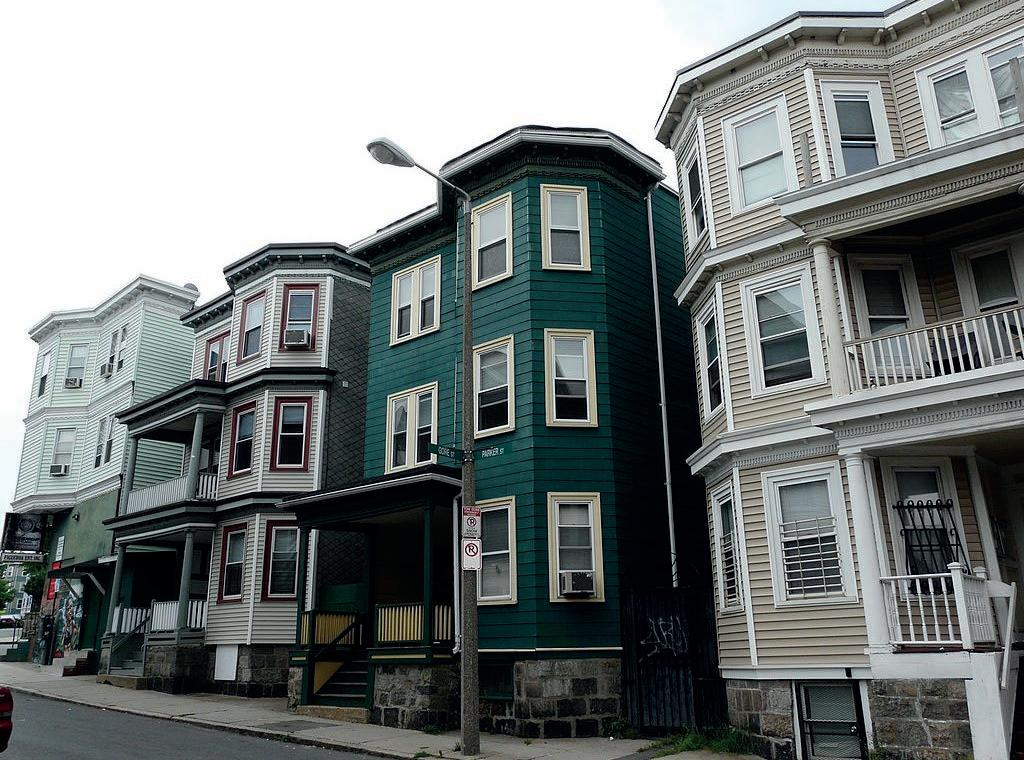
Finally, in an unfortunate echo of rent control policies from the 1970s and 1980s, Mayor Wu’s plan would provide for the city to establish an “administrator or board” to oversee rent control
regulations. Similar boards supervising past rent control rules became controversial because they were, at best, a substantial administrative expense, and at worst, vulnerable to corruption.
Mayor Wu’s plan would also allow for the city to regulate, by ordinance, condominium conversions and rental unit demolitions requiring move-outs. It would set citywide rules for tenant notification, relocation plans and payments to tenants, along with permitting guidelines and exemptions.
MassLandlords has scanned 2.7 gigabytes of minutes from rent control boards during the rent control years of the 1970s and ‘80s. We intend to create a website to publish our findings to demonstrate the vagaries of bureaucracy at work.
RENT CONTROL IN OTHER STATES
Mayor Wu states in her petition that her rent control proposal is modeled on rent control policies recently enacted in Oregon and California. In 2019, Oregon became the first state to implement statewide rent control. California followed in 2020, with a few differences
from the Oregon law. Oregon’s policy restricts rent hikes to 7% above CPI in a given year. California’s law sets the cap at 5% over CPI, with carve-outs for municipalities that have rent control already in place.
Unlike Mayor Wu’s proposal with its 10% hard cap, neither California nor Oregon place maximum caps on rent increases. In 2022, the Oregon rent increase limit was 9.9%, but in 2023 (based on 2022 inflation percentage), it is set at 14.6%. It’s notable that Mayor Wu specifies that “advertised rents” in Boston increased by 14% in 2022 – less than Oregon’s increase allowed under rent control in 2023 – as a way to justify the need for rent control.
Several other states and cities are also considering or in the process of enacting rent control policies. One widely publicized example is St. Paul, Minn. The mid-size city abutting Minneapolis passed one of the nation’s strictest rent control laws in 2021 following ballot approval by voters. Under the law, St. Paul housing providers are allowed to increase rents no more than 3% in a 12-month period. Changes were made to the policy after its initial enactment when city legislators noted major decreases in new housing developments, and large-impact cancellations of some new affordable housing projects.
Even some of the 31 states that have banned rent control like Massachusetts are contending with communities lobbying to override state law and restrict rent increases. Cities in Florida and Nevada have introduced rent control policies. State legislatures in Illinois, Washington, Colorado, Connecticut and Rhode Island have seen various proposals recently. So far, no further rent control legislation has passed, but the issue is likely to hold interest as long as the nation’s housing shortage and resultant high market prices continue.
RENT CONTROL MAKES NO ECONOMIC SENSE
It’s been long established that rent control doesn’t work. Mayor Wu and others repeat that rent control is needed to help low- and middle-income citizens
March 2023 6 MASSLANDLORDS NEWSLETTER MASSLANDLORDS IS FUNDED PRIMARILY
YOUR
BY MEMBERSHIP DUES. THANK YOU FOR
SUPPORT.
Some Boston triple-deckers and multifamilies would not be subject to rent increase restrictions in Mayor Wu’s rent control proposal, which would exempt owner-occupied rentals containing six or fewer units. Image: CC BY-SA 2.5 Piotrus, Wikimedia Commons.
to secure housing that they can afford. Yet, multiple studies have concluded that wherever rent control has been implemented, affordable housing stock decreases and average rent prices increase. Rent-controlled properties end up occupied disproportionately by people who can well afford them, not by those they were intended to help.
One way to possibly avoid some of rent control’s most serious flaws would be to means test rent control for income. In theory, means testing would exclude renters with income over a set threshold from benefiting from rent-controlled rates. Without means testing in the past, rent-controlled units were too often monopolized by high-income renters, such as the mayor of Cambridge, for one example. However, a means-testing formula would be complicated. It wouldn’t apply to renters who receive vouchers, such as Section 8 program participants, because their full rent is guaranteed. To be effective, means testing would have to narrowly target a band of
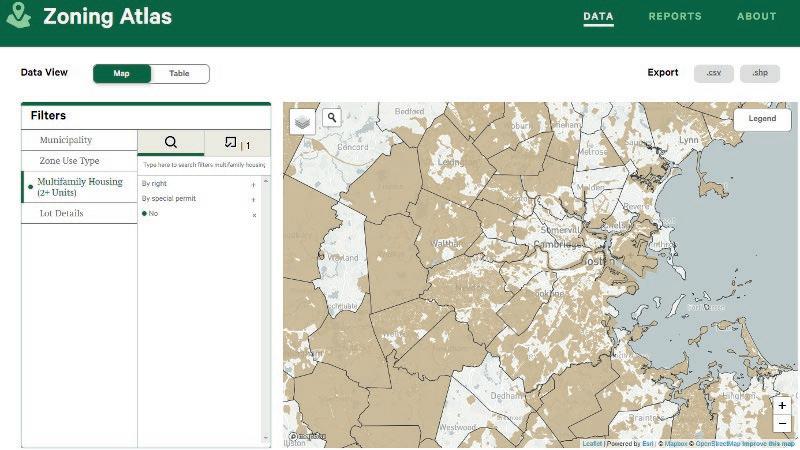
low-income renters who earn above the voucher threshold. But means testing at any level is conspicuously absent from Mayor Wu’s proposal.
It’s no surprise that a large majority of economists agree that rent control is not effective policy. It doesn’t make economic sense. High rents and home prices are economic indicators that demand is high while supply is relatively low. Otherwise, high rents wouldn’t be sustainable. Renters searching for homes would simply pass up high-priced units for better deals.
Not coincidentally, two of the cities in the U.S. with the highest rents, New York City and San Francisco, have both had rent control policies in place for many years.
Restricting the amount that housing providers can raise their rents does nothing to increase supply. In fact, it has an overall negative impact on supply for several reasons. It discourages renters from moving out of rent-controlled units. It also discourages new permits for
rentals, encourages conversions to condos and other uses, and encourages long-term vacancy and “mothballing” for extended periods (such as, until after rent control is rescinded again because it’s proven to be so disastrous for housing).
Meanwhile, amid the resultant reduction in supply, demand for rentals remains constant, so that landlords of non-controlled units are able to hike their rents even more than they would in a normal, unrestricted market.
BETTER SOLUTIONS THAN RENT CONTROL
Rent control unnecessarily creates a circumstance in which people holding rental units when rent-control policies take effect are the winners. Everyone else loses: rental owners, who lose funding for upkeep and improvements; renters seeking affordable housing, because fewer affordable units are available over the long run; and the city, which forfeits potential housing development as investors turn to other,
7 March 2023 MASSLANDLORDS NEWSLETTER MASSLANDLORDS IS FUNDED PRIMARILY
BY MEMBERSHIP DUES. THANK YOU FOR YOUR SUPPORT.
The MAPC Zoning Atlas shows in brown regions where multifamily housing is not allowed. Half of Boston is zoned effectively single family through parking requirements, floor-area ratios and setbacks. Public Domain Metropolitan Area Planning Council
unrestricted communities and more profitable projects.
But what if there were solutions that didn’t create winners and losers? As it happens, there are such options. And many of them are right in plain sight.


Rental assistance is one option. In the immediate term, while awaiting recent policies that encourage more housing development, increased rental assistance provided by the state (with some federal government funds) and city programs can help thousands of renters remain in their dwellings. Such programs are already in place, such as RAFT (Rental Assistance for Families in Transition) and HCVP (Housing Choice Voucher Program).
Of course, the efficacy of these programs depends on their successful administration. Unfortunately, in Massachusetts, tens of thousands of applications for rental assistance have been mishandled or “timed out” since the pandemic for unexplained reasons, resulting in untold numbers of evictions that might have been avoided. MassLandlords is amid a lawsuit against the Department of Housing and Community Development (DHCD) seeking information about these mismanaged rental assistance applications, to shed light on what exactly happened and why.
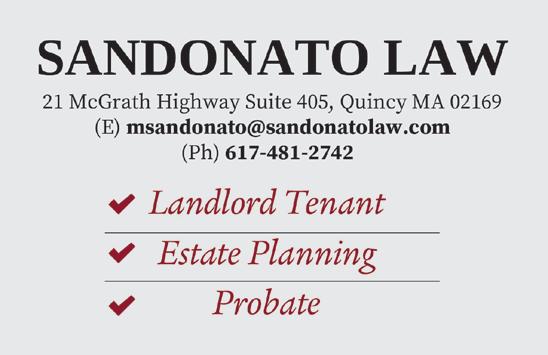
In the long term, zoning changes will help boost housing stock. Policies have already been enacted that allow municipalities to change local zoning ordinances by a simple majority vote. Such changes
could open the door for multifamily housing, accessory dwelling units, open-space residential development and other projects that could boost affordable housing stock.
More zoning changes are needed. Many wealthy communities – especially Boston and its surrounding municipalities –maintain restrictive single-family zoning, with prohibitive setback, parking and lot size requirements. Such policies deter affordable housing development. Half of Boston is effectively zoned for single-family only, a condition that significantly restricts the city’s ability to expand its housing base. Shifting residential zoning in the city to multifamily by right would open thousands of opportunities for new housing construction. So far, multifamily by right zoning is not on Mayor Wu’s menu of housing proposals.
RENT CONTROL THAT COULD WORK
Finally, rent control is an option, one that MassLandlords and housing providers could support – as long as property owners are compensated by the municipal or state government for the difference between market price and their restricted rent price.
MassLandlords recently submitted a letter to the Boston City Council pointing out that rent control is currently legally allowed under the above condition, as a provision of M.G.L. Chapter 40P, the state law prohibiting rent control. The 1994 ballot initiative banning rent control
included an exception that remains in place: Section 4 of Chapter 40P allows towns and cities to enact rent control under certain conditions, one being that the local government must reimburse rental property owners for the market loss they incur as a result of rent control.
RENT CONTROL A COUNTERPRODUCTIVE OUTLIER
Mayor Wu’s rent control proposal still has a way to travel before it would become law. Even if approved by the Boston City Council – not a certainty – it would need the signature of Governor Maura Healey. Healey has left the door open on such legislation, stating that “it’s up to local communities to make those decisions.”
Both Wu and Healey have introduced or passed legislation aimed at alleviating Boston’s and the state’s housing crises. Massachusetts ranks seventh in the nation among states with the highest rents, according to U.S. News, with a one-bedroom apartment renting for an average of $1,409. That statewide average is pulled northward by Boston’s high rental prices. The state’s largest city now ranks second in the nation for high rents, trailing only New York City, according to a national rent study by Zumper. That analysis finds an average two-bedroom apartment in Boston rents for $3,430.
Governor Healey has taken the steps of appointing a housing office and cabinet-level secretary to focus specifically on housing solutions. Longtime Salem
March 2023 8 MASSLANDLORDS NEWSLETTER MASSLANDLORDS IS FUNDED PRIMARILY
YOU FOR YOUR SUPPORT.
BY MEMBERSHIP DUES. THANK
mayor Kim Driscoll was appointed to that secretariat.
For her part, Mayor Wu has proposed plans addressing housing as part of her legislative agenda for 2023-24. One of her proposals is a levy of 2% on real estate transactions over $2 million, aimed at helping to provide funding for affordable housing and increase tax credits for low-income senior homeowners.
Unfortunately, the 2% levy and its impact on ROI would likely deter investments in rental housing. Alternatively, MassLandlords recommends a 2% tax on single-family dwellings as a way to encourage multifamily zoning and disincentivize residential zoning that swallows up land and stifles housing expansion.
Wu also proposes changes to the city’s Inclusionary Development Policy (IDP) that would lower the threshold
requirement for affordable housing in new developments from 10 units to seven, and would increase the required percentage of income-restricted rental units in such developments from 13% to 20%. Again, such a change may further dampen enthusiasm among housing investors and developers as they steer clear of projects and places with policies that eat away at their investment returns.

Boston is an attractive place to live, work and learn. But the city – and the entire state – desperately needs more housing, especially affordable, multifamily housing. Policies that discourage investment and corrode business income only serve to reduce the supply of new, affordable and rental housing against demand.

Rent control is the foremost example of such a discouraging policy. ML

9 March 2023 MASSLANDLORDS NEWSLETTER MASSLANDLORDS IS FUNDED PRIMARILY
DUES. THANK YOU FOR YOUR SUPPORT.
BY MEMBERSHIP
your camera app here to read more online. YOUR ENVIROMENTAL PEST AND LAWN PROFESSIONALS FORDSHOMETOWN.COM
Point
How Do Rent Control Boards Benefit the Wealthy and Well Connected?

This article has been adapted from testimony submitted to Boston City Council on Feb. 22 opposed to Docket #0408 rent control.
Under rent control, Boston housing providers should be expected to hold units vacant longer, waiting for the perfect applicant to arrive. This happened in Cambridge. During Cambridge’s rent control years, many well-off individuals infamously occupied rent controlled housing. This includes Cambridge Mayor Ken Reeves, 1992 to 1995, who lived in a spacious rent controlled apartment,
and state Supreme Court Justice Ruth I. Abrams, who also lived in rent controlled housing.
We have discussed elsewhere how this framework has an unlawful disparate impact on the basis of race. When landlords cannot be assured of keeping pace with inflation, and cannot even be sure of evicting a bad renter, landlords hold apartments vacant longer waiting for a perfect applicant. The result is that the renters most likely to get a rent controlled apartment are the least likely to need it. The Black-white wealth gap and other systemic factors caused only 8% of rent controlled units to go to renters of color,
even though at the time 22% of the city’s residents were residents of color.
So who would propose such a backwards scheme? The mayor’s appointees on the Rent Stabilization Advisory Committee are not disadvantaged renters. Nor are they residential landlords. The appointees are primarily well-connected and institutional campaign donors. And weighted by dollars, they are preeminently real estate developers.
As of March 16, 2022, shortly after the Rent Stabilization Advisory Committee was announced, the Massachusetts Office of Campaign and Political Finance identified 17 of the 25 appointees as
March 2023 10 MASSLANDLORDS NEWSLETTER MASSLANDLORDS IS FUNDED PRIMARILY
BY MEMBERSHIP DUES. THANK YOU FOR YOUR SUPPORT.
Colliers donated $88,330.12 to influence Massachusetts politics prior to being named on the Rent Stabilization Advisory Committee (RSAC). Their website is a beautiful example of how the RSAC was not representative of housing providers in Boston and Massachusetts. Fair Use.
previous or current personal contributors to Massachusetts political races:
a. Kathy Brown, coordinator at Boston Tenant Coalition, had given $135.
b. Carolyn Villers, executive director at Mass Senior Action, had given $140.
c. Lauren Song, senior attorney at Greater Boston Legal Services, had given $175.
d. Kimberly Sherman, president of Related Beal, had given $500.
e. Beyazmin Jimenez, Abundant Housing Massachusetts Board president, had given $770.94.
f. Karen Chen, executive director at Chinese Progressive Association, had given $1,352.
g. Megan Sandel, associate professor of pediatric medicine at Boston University, had given $1,500.
h. Chanda Smart, CEO at Onyx, had given $1,700.
i. Michael Kane, executive director at HUD Tenant Alliance, had given $3,415.
j. Lisa Owens, executive director at Hyams Foundation, had given $4,125.
k. Jeanne Pinado, vice president of capital markets at Colliers International, had given $5,004.
l. Joe Kriesberg, president of Massachusetts Association of Community Development Corporations, had given $7,260.
m. Curtis Kemeny, CEO and president of Boston Residential Group, had given $13,835.50.
n. Dermot Doyne, local landlord and business owner, had given $18,250.
o. Josh Zakim, founder and executive director at Housing Forward MA, had given $19,407.
p. Kirk Sykes, managing partner at Accordia Partners, had given $40,513.
q. Brian Kavoogian, managing director (or partner) of National Development, had given $143,482.35.
As of March 16, 2022, the Massachusetts Office of Campaign and Political Finance identified 21 of the 25 organizations represented by appointees as previous or current contributors, via their employees, to Massachusetts political races:
a. Employees disclosing that they worked for the Harvard Joint Center for Housing Studies gave in aggregate $70.
b. Employees disclosing that they worked for Abundant Housing Massachusetts gave in aggregate $368.
c. Employees disclosing that they worked for Mass Senior Action gave in aggregate $936.
d. Employees disclosing that they worked for the HUD Tenant Alliance gave in aggregate $1,368.
e. Employees disclosing that they worked for the North Atlantic States Regional Council of Carpenters gave in aggregate $1,425.
f. Employees disclosing that they worked for Onyx gave in aggregate $1,475.
g. Employees disclosing that they worked for Accordia Partners gave in aggregate $1,805.
h. Employees disclosing that they worked for City Life/Vida Urbana gave in aggregate $4,526.
i. Employees disclosing that they worked for the Massachusetts Association of Community Development Corporations gave in aggregate $6,645.
j. Employees disclosing that they worked for the Hyams Foundation gave in aggregate $7,328.
k. Employees disclosing that they worked for the Chinese Progressive Association gave in aggregate $7,670.19.
l. Employees disclosing that they worked for Housing Forward MA gave in aggregate $8,026.
m. Employees disclosing that they worked for the Boston Teachers Union gave in aggregate $15,362.58.
n. Employees disclosing that they worked for Related Beal gave in aggregate $15,381.
o. Employees disclosing that they worked for the 1199 SEIU gave in aggregate $18,443.84.
p. Employees disclosing that they worked for Boston Residential Group gave in aggregate $18,485.
q. Employees disclosing that they worked for Urban Edge gave in aggregate $19,494.46.
r. Employees disclosing that they worked for the Greater Boston Legal Services gave in aggregate $48,969.
s. Employees disclosing that they worked for Colliers International gave in aggregate $88,330.12.
t. Employees disclosing that they worked for National Development gave in aggregate $308,222.
u. Employees disclosing that they worked for Boston University gave in aggregate $597,780.57.
If someone were in the market to purchase distressed properties, they could hardly do better for themselves than to enact a subjective rent control scheme. Rent control would drive mom and pop housing providers to sell under duress. If such an investor were well enough connected to sit on the rent control board, or have sway there, they could pick and choose which properties to hammer down.
City Life/Vida Urbana, to cite one example, have demonstrated their interest both in political appointment and in real estate acquisition. They were appointed to the Rent Stabilization Advisory Committee twice (once directly, via Helen Mathews-Turner, and once discreetly, via prior executive Lisa Owens). Furthermore, with the help of the Mayor and others, City Life/Vida Urbana co-acquired 114 apartments across 36 buildings in East Boston on Oct. 14, 2022. ML
11 March 2023 MASSLANDLORDS NEWSLETTER MASSLANDLORDS IS FUNDED PRIMARILY
BY MEMBERSHIP DUES. THANK YOU FOR YOUR SUPPORT.
here to
more online.
Point your camera app
read



Property Maintenance Owner Communication Bookkeeping Rent Collection Leasing & Tenant Screening Creative Solutions What we do, so you don’t have to. The MerGo Experience Customer Service focused, MerGo brings a fresh perspective to Property Management. Our Services Boston • Brookline • Cambridge • Somerville • Medford • Newton • Watertown Contact: Lucas Merchant • lucas@mergogroup.com • (617) 990-6201 • mergogroup.com PROPERTY MANAGEMENT 5% Flat fee & No Maintenance or Service Upcharge Get the responsive service you, your property, and tenants expect, plus the ROI you deserve. Currently accepting new clients.
How Technology Can Help with Virtual Showings and Renting Apartments
By Kimberly rau, MassLandlords, Inc.
Over-the-phone or Zoom tours can narrow down prospective tenants and help out-of-state renters
Virtual rental tours started as a necessity for real estate agent Sherri Way during the pandemic. Travel restrictions were in place, but people were still moving. They were moving for new jobs after pandemic-related closures, or relocating after their current job went remote. But everyone was skittish about letting strangers into their homes. She needed to find a way to connect people with housing, but not endanger the people currently living there. Three years later, this technological workaround has become standard practice.
“We kind of turned the process around,” said Way, who operates in the MetroWest area of the state. She noted that before the pandemic, the general procedure for getting an apartment rented was to show the property, then take applications and screen potential tenants. But with lockdown restrictions ever-tightening in 2020, Way knew that wouldn’t work anymore.
“We didn’t want to do showings unless people were really qualified or really interested,” she added. Way started asking tenants who were currently living in the soon-to-be-available units to take videos of the home, along with measurements of each room. Those virtual assets were then sent to potential tenants, who could visualize the space. If they liked what they saw, Way would send them the rental application and perform her standard full-tenant
screening. If they passed, she would then conduct an in-person showing if they wanted one.
“Since the pandemic’s over, we kept the video and the application part in place,” Way said. She only shows rentals to qualified prospective tenants. This cuts down on foot traffic in the unit, which the current residents appreciate. It also saves time for the landlord or rental agent, as the tire kickers and no-shows are largely weeded out during the application and screening processes.
Want to embrace technology in your own rental showing? Read on to learn about three best practices for virtually showing rental units and narrowing
the field before anyone steps foot in the apartment.
BEST PRACTICE #1: VIDEOS AND MEASUREMENTS HELP POTENTIAL RENTERS DECIDE
If the unit you want to rent out is empty, then go in yourself and take pictures and a short video tour of the rental. A walk-through video will help renters understand the layout of the place much better than a collection of still photos. Think of all the housing ads you’ve seen in which, even after 30 photographs, you’re still not sure where the third bedroom is in relation to the rest of the place. Make sure you include any
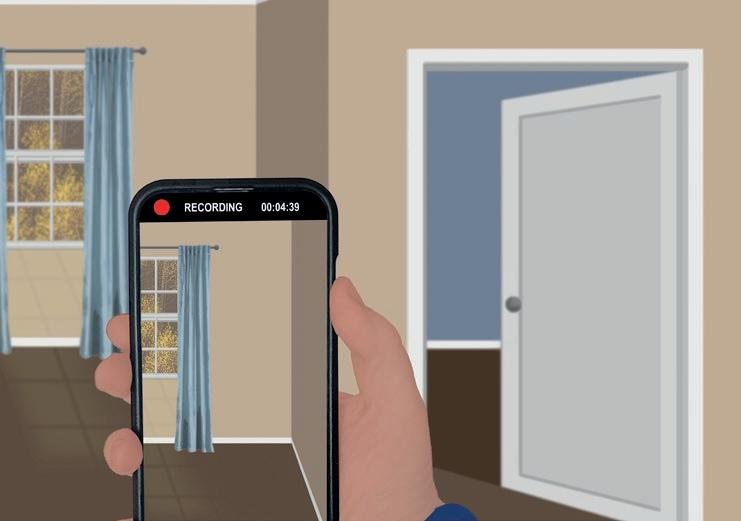
March 2023 14 MASSLANDLORDS NEWSLETTER MASSLANDLORDS IS FUNDED PRIMARILY BY MEMBERSHIP DUES. THANK YOU FOR YOUR SUPPORT.
Video tours are a great way to let people visualize your rental unit while minimizing foot traffic in the apartment. (Image license: CC by SA 4.0 MassLandlords, Inc.)
features you want to highlight, such as the walk-out to the backyard, or in-unit laundry hookups.
Then, get out your measuring tape and get dimensions of all the rooms. You may already have these from when you bought the property; just make sure they take into account any renovations you might have done. Providing these measurements is important. Renters bring furniture with them; they need to know if the rooms will be big enough to meet their needs. Can the living room accommodate their three-piece sectional? Is that second bedroom big enough for two twin beds? Will the main bedroom fit their California king mattress?

If the unit you are looking to rent out is currently occupied, ask your tenant if they would be willing to take the video and measurements for you. Remind them that doing so will likely cut down on the number of in-person tours that you will need to do. If they are not able to help you, work out a time with them when you can come in and do it yourself.
BEST PRACTICE #2: APPLICATIONS CATCH WHAT A PRE-SCREENING MAY MISS, AND VICE VERSA
Now that you have your video and measurements, it’s time to advertise the apartment. If you can’t upload the video to the listing site of your choice, you can state it is available and send it to interested tenants.
Way was clear that she both prescreens her potential renters and has them fill out a rental application (this is
ours, made available free to members). Seeing the application ahead of time gives Way a good idea of whether the tenant is likely to be approved. And, the application catches things that the pre-screening may not.

She also makes sure to verify income, and asks if the tenant has pets, or is a smoker. She checks for prior evictions. If people balk at filling out the application before taking an in-person tour of the place, that doesn’t bother Way.
“If you’re not interested in filling out the application, then you’re obviously not interested in the place and you’re a tire kicker anyway,” she stated. This wastes her time, and if the unit is still occupied, the current residents’ time as well.
“Your goal is to get qualified tenants who you want to rent to,” said Way. “And the best way to do that is to get as much information about them up front as you can.”
BEST PRACTICE #3: SET UP SHOWINGS ONLY FOR TENANTS WHO PASS THE INITIAL SCREENING
If the potential renter fills out the application and passes the pre-screening, then it’s time to do an in-person showing. In Way’s experience, since only truly interested tenants reach this stage, the number of no-shows for tours has dropped.
Way said that now that pandemic restrictions are a thing of the past, she strongly urges even out-of-state applicants to see the home in person. At the very least, she asks them to send a trusted representative to come out and
take a tour, so they can vet the place with their own eyes before signing a rental agreement. If this is impossible, Way can do a Zoom meeting and live walkthrough of the place.

After the pandemic, some people are still uncertain about strangers walking through the home they are living in. Way advises her clients to wear masks. This adds another layer of comfort for everyone.
CONCLUSION
Virtual tours and Zoom walk-throughs may not be for everyone. There are plenty of renters who either cannot or do not want to embrace technology at the level that makes such things possible. But technology isn’t going away, and trying to get a vacancy filled can be a time-consuming process. Utilizing certain tools can save you a lot of time and energy, and it’s easier than you think to get started. If you have a smartphone with a data plan, you have all the tools you need to incorporate video tours and Zoom meetings into your leasing practices. Why not give it a try? ML
15 March 2023 MASSLANDLORDS NEWSLETTER MASSLANDLORDS IS FUNDED PRIMARILY BY MEMBERSHIP DUES. THANK YOU FOR YOUR SUPPORT. Deodorization - Odor Removal Sewerage Clean-up Remediation Reconstruction Water & Flood Damage Restoration Fire & Smoke Restoration Drying & Dehumidification 800-783-0552 Available 24/7 svmgilmore.com HEALTHY HOMES FOR BETTER LIVING! • Indoor Air Quality • Lead Paint Inspections • Mold Testing & Analysis • Serving all of MA & NH Call Toll Free: 800-349-7779 1 Arcadia St. Dorchester, MA 02122 Phone: 617-288-8870 Fax: 617-282-7783 Inspections@asapenvironmental com www.asapenvironmental.com Osterville 508-428-1669 Brockton 508-580-4800 Rockland 781-982-8700 Worcester 508-755-7320 Lawrence 978-686-0003
your camera app here to read more online.
Point
Can a Landlord Put Professional Cleaning Fees in a Lease?
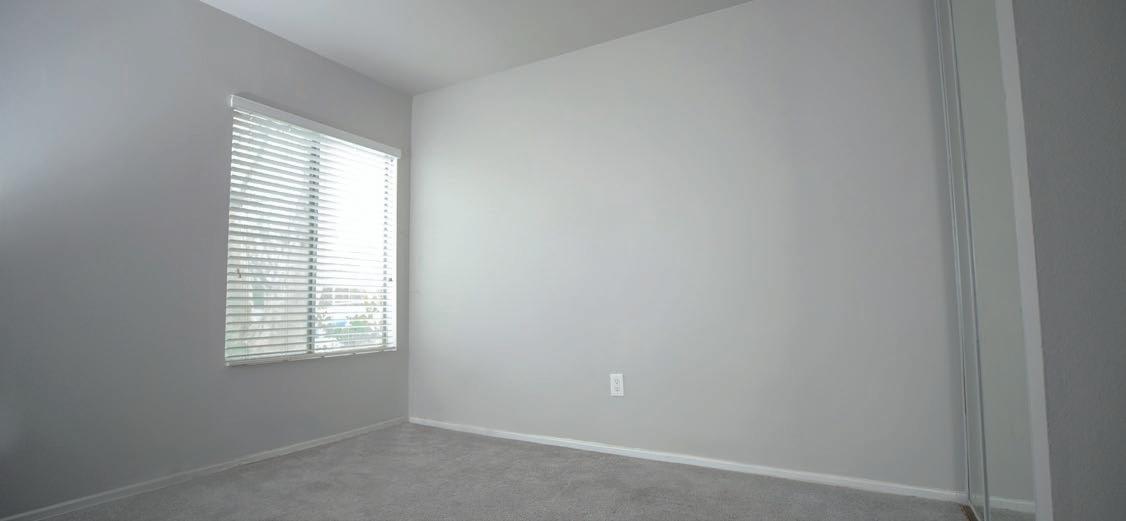 By Kimberly rau, MassLandlords, Inc.
By Kimberly rau, MassLandlords, Inc.
Security deposit law says you cannot deduct from the security deposit for reasonable wear and tear, but can you charge your tenants for cleaning after they move out?
A recent question on Reddit in the legal advice forum had a Massachusetts tenant asking if their landlord could bill them for a professional cleaning fee after they moved out. The cleaning fee was not deducted from the security deposit, and the rental agreement allegedly stated that a cleaning fee would only be assessed if the unit
was found to be in “unsatisfactory condition.”
“My landlord…sent me a $500 invoice stating ‘deep clean’ and asked me to pay,” wrote the tenant. “The apartment was cleared by me in time and of all my personal items. It was left in a very reasonably clean state.” The tenant went on to say that their landlord was threatening to report them to a credit bureau if they didn’t pay up.
Is the landlord acting lawfully here? Can you legally charge your tenant a cleaning fee for a rental unit, even if security deposit law says you cannot deduct for reasonable wear and tear? The answer is a bit more complicated than you might expect.
In this article we’ll look at what kinds of cleaning fees are okay, what kinds fall into a gray area, and how you should manage each approach.
LAWFUL: DEDUCTING FROM THE SECURITY DEPOSIT FOR DAMAGE
The law is clear that charges for reasonable wear and tear may not be withheld from your tenant’s security deposit. But damage is another story. If your tenant’s dog chews up the woodwork (even if the dog is an authorized pet or support animal), you can charge for the repair of the damage. If the tenant smokes in a no-smoking unit, you can charge for the cleaning to get the smell out.
March 2023 16 MASSLANDLORDS NEWSLETTER MASSLANDLORDS IS FUNDED PRIMARILY
YOU FOR YOUR
BY MEMBERSHIP DUES. THANK
SUPPORT.
You ask your tenants to leave the rental broom clean when they move out, but is it lawful to hire a cleaning company and ask them to pay? The answer is, it’s complicated. (Image license: Unsplash)




Protect Your Home tel. 508-791-1141 info@JJMInsurance.com fax 508-753-5630
What you should know: security deposit law in Massachusetts is very strict. For repairs that you can deduct from the security deposit, you must provide an itemized list of damages within 30 days of the end of the tenancy. You need to provide receipts or invoices for the charges associated with the damage, and you need to sign that notice “under pains and penalties of perjury.” You also can’t deduct for any damages that were identified when the tenant moved in.
GRAY AREA: ADDING A CLEANING FEE TO YOUR LEASE
The security deposit law covers deposits. It is unlawful to take any deposit beyond first and last month’s rent, a security deposit that does not exceed the first month’s rent, and the cost of re-keying the rental unit. However, the Flemming v. Greystar court case established that pet rent is not considered a deposit. Taking a separate pet deposit would be unlawful, but an increase in rent for having a pet is lawful.
How does this relate to cleaning fees?
Taking a deposit for a deep clean at the start of the lease would be unlawful, as it is an extra deposit not allowed under Massachusetts law. Adding an end-oflease cleaning fee could fall in the same bucket. Proceed with caution.
What you should know: state law prohibits landlords from using unfair or deceptive practices to rent out their units. If you are going to try to charge a cleaning fee at the end of the tenancy, this fact must be disclosed in the ads you take out seeking tenants. It must be disclosed again at lease signing, and noted in the lease, and then disclosed again when you send that final bill. (We doubt the landlord in the Reddit case was this thorough.) To our knowledge, this has not yet been
tested in court, so talk with an attorney before going forward.
GRAY AREA: ISSUING A UNILATERAL CLEANING INVOICE
You can deduct from a security deposit for issues beyond reasonable wear and tear, and you may be able to add a cleaning fee to your lease (again, this has not been tested in court). But should you issue your former renter an invoice for cleaning the unit after they leave?
This is another gray area because the security deposit law would certainly not let you deduct a regular cleaning fee from the security deposit. A dirty kitchen floor, messy carpets, windows with smudges, etc., would all fall under the category of reasonable wear and tear. A separate invoice, if they don’t leave the place clean, may be legal to send out but hard to collect on. It may be possible, if you mentioned the potential for billing in the rental ad and lease agreement, and then wanted to take your tenant to small claims court to collect. That may be more trouble than it’s worth.
Operators familiar with short-term rentals may be thinking, “If I can charge a cleaning fee on Airbnb, then I can charge a cleaning fee in a long-term rental.” Short- and long-term rentals are not the same in Massachusetts. And remember also that on Airbnb in particular, cleaning fees are disclosed in the ad.
CAN A LANDLORD REALLY REPORT A TENANT TO A CREDIT BUREAU?
So, what about our landlord mentioned in the Reddit thread? Is that tenant really at risk of getting reported to the credit bureaus if they don’t pay the cleaning invoice?
We don’t know the whole story, of course, but it’s likely the landlord in question is bluffing. The RentHelper software we helped develop reports
on-time payments to the credit bureaus, and we get each user’s explicit permission to do so when they enroll. You cannot send someone an invoice and then just report them to the credit bureaus if they don’t pay it without some kind of prior permission from them. This landlord is not likely to be able to ding their former tenant’s credit score if they don’t pay the invoice.
The landlord may be able to take the former renter to small claims court over the invoice. Success would depend on whether the cleaning fee was a lawful lease clause the tenant agreed to. If the landlord followed the steps we detailed above, then maybe (and then we’d have court precedent for cleaning fees in the lease). We’re assuming the place was not left in shambles, because the landlord could have deducted the repairs from the security deposit.
CONCLUSION
Cleaning fees in the lease are likely okay as long as you disclose them from the very first advertisement through the end of the tenancy, but this has not played out in court. Make sure you run this by your attorney if you’re thinking of going this route. And as always, follow the security deposit law to the letter, make sure you have your conditions statement, and don’t deduct from the deposit for cleaning. This way you’re better covered if you walk into a disaster when the tenancy ends. ML
Point your camera app here to read more online.
March 2023 18 MASSLANDLORDS NEWSLETTER MASSLANDLORDS IS FUNDED PRIMARILY BY
DUES. THANK YOU FOR YOUR SUPPORT.
MEMBERSHIP
MassLandlords Testimony Against Boston Rent Control Docket #0408
MassLandlords staff drafted and submitted the below testimony opposed to Docket #0408 on rent control.
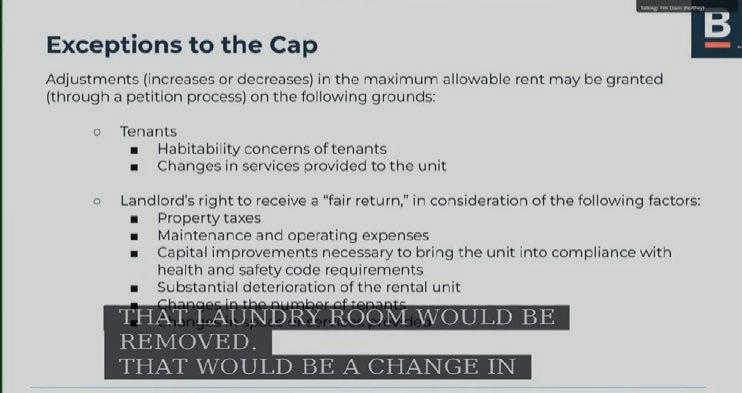
On Feb. 21, MassLandlords drafted filed the testimony below opposed to Boston mayor Michelle Wu’s Docket #0408, which would enact rent stabilization (really, rent control) and tenant eviction protections.
The testimony might surprise readers not familiar with MassLandlords’ mission to create better rental housing.
First, we argue that the primary flaw with rent control is its disparate impact on the basis of race. This argument ought to resonate with Boston residents better than the equally valid
economic arguments about housing quality and supply.
Second, we point out the corrupting influence of money on this developer-friendly scheme. Developers are exempt for 15 years, whereas landlords who conduct similarly massive renovations are not. Why? Because landlords are not campaign donors, it would seem.
Finally, we show how the council can have a form of rent control-turnedrental assistance that landlords can live with. Under General Law Chapter 40P, towns can reimburse owners for the damage caused by rent control while still giving absolute price locks to residents, if they choose.
Zoning reform and rental assistance remain our primary recommendations in this housing crisis.
MassLandlords remains comprehensively opposed to Docket #0408, which penalizes renovations, imposes rent control boards, and enacts just cause eviction. ML
Point your camera app here to read more online.

19 March 2023 MASSLANDLORDS
MASSLANDLORDS IS FUNDED PRIMARILY BY MEMBERSHIP DUES. THANK YOU FOR YOUR SUPPORT.
NEWSLETTER
At the Boston City Council rent control hearing on Feb. 22, Tim Davis, Deputy Director of Research and Development, Office of Housing Stability showed how the cap can be disregarded by the rent control board. Public Domain.
Read the testimony.
Why Was Cambridge’s Rent Control Racist? Why Would Boston’s Be the Same?
providers hated it for many reasons and worked to repeal it. We repealed rent control in 1994. Economists have since studied Massachusetts as a “natural experiment” on whether rent control is good or bad. We now know what landlords in 1994 could not have known: Rent control is bad for its racist disparate impact.
The mayor of Boston proposes to prohibit landlords from increasing rent by the rate of inflation. Furthermore, the mayor proposes to restrict the means by which landlords may recover possession of a rented dwelling unit (so-called “just cause eviction”). The two together would effect a form of rent control that we have already tried in Massachusetts.
Massachusetts had rent control in some communities for roughly 25 years. Housing
Proponents of rent control argue that rent control will prevent renters, especially renters of color, from being displaced. This is true, in the sense that rent control helps anyone who has an apartment the day the law is passed. There are studies and research on this. The anti-displacement picture is clear. But this is not the whole picture.
The problem becomes visible when we consider applicants for new housing over decades of a rent control regime. We
know from researching Massachusetts’ own history that rent control hurts applicants of color far in excess of any transient stabilization benefit.
In 2007, David Sims, Economics Department at Brigham Young University, published “Out of control: What can we learn from the end of Massachusetts rent control?”, J. Urban. Econ. 61 (2007) 129-151. Among many other findings, this one stands out:
Only 8% of renters of color occupied rent controlled units, even though 22% of the residents in those cities were residents of color. There was a clear adverse disparate impact against renters of color during rent control.
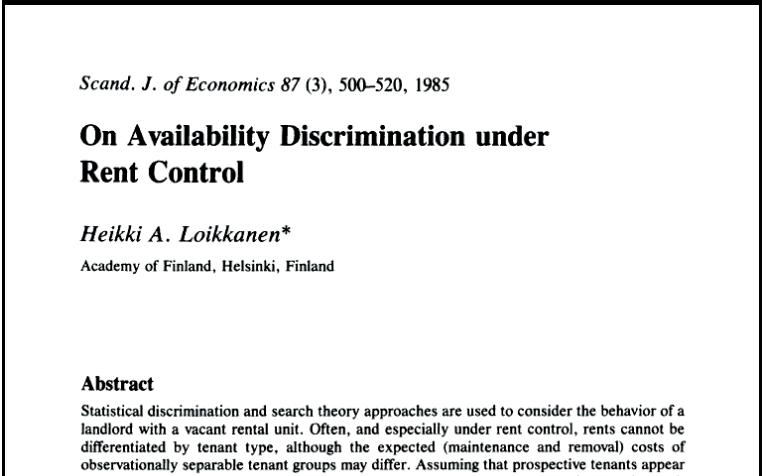
The adverse disparate impact was caused by rent control. The Economist magazine further studied the situation. In the article “Rent Control: The Morning After,” the Economist showed that when rent control was repealed, the number of people of color in formerly controlled housing doubled to be more equal to what you'd expect based on the city population.
What was going on?
Normally, landlords can increase rent to offset perception of risk, including credit, income and criminal history, for marginal applicants. Under rent control, especially with just cause eviction, landlords hold units vacant longer waiting for applicants with high credit, high income and no history of minor criminal record. Such applicants will tend to be disproportionately and unfairly white. There is a Black–white wealth gap, and much more systemic racism, that disadvantages people of color on rental applications. There doesn’t need to be any personal racism at all for systemic racism to appear.
March 2023 20 MASSLANDLORDS NEWSLETTER MASSLANDLORDS IS FUNDED PRIMARILY BY MEMBERSHIP DUES. THANK YOU FOR YOUR SUPPORT.
The following has been adapted from written testimony provided to the City of Boston Hearing for Docket #0408 on rent control Feb. 22, 2023.
The cover of the 1985 paper that predicted discrimination and disparate impact under rent control. One conclusion of this paper was supported by data from David Sims in 2007 studying Cambridge. Fair Use.
In America, and in Boston, no less, we have long had a Black–white wealth gap and rental-application gap.
• The Economic Policy Institute shows the 2018 median household income was $41,692 for Black households and $70,642 for white households.
• ApartmentList shows Black households are twice as likely to be evicted as white households.
• The Urban Institute shows 21% of Black households have a FICO credit score above 700, whereas 50% of white households do.
• A report from the Sentencing Project shows Black Americans constitute 53% of drug convictions, despite representing 14% of drug users.
Rent control and just cause eviction together drive landlords toward tougher screening metrics. And the numbers in America, and in Massachusetts, no less, differ unfairly by race.
Despite strong protections against personal discrimination, rent control worsens systemic racism. This work builds on extensive research in this field, including Heikki Loikkanen’s “On Availability Discrimination under Rent Control,” Scan. J. Econ., Sep., 1985, Vol. 87, No. 3, pp. 500–520. Loikkanen gives us the ability to predict exactly how much systemic racism will result from rent control. The answer is bad for all rent control proposals, mitigated only to the extent rent control is curbed or restricted. We might as well not have it.
With the data available publicly, any rent control system would be immediately challengeable under Title VIII of the federal Civil Rights Act of 1968 (the Fair Housing Act). It doesn’t matter which buildings are exempt or not, or whether the allowable rent increase is above or below CPI. These refinements are the proverbial rearranged deck chairs on the Titanic. Rent control is not a solution on any scale. To allow only a little rent control in just one town

hurts everyone in all towns: It reduces supply there, drives people out of town and makes housing more expensive everywhere else. Plus, as Dr. King wrote from jail, “Injustice anywhere is a threat to justice everywhere.” We must work diligently to eliminate systemic racism in Massachusetts and to correct the housing market by statewide – not local – action. The legislature and the courts will not allow Boston so-called “local choice.”
Rent control helps only those who have an apartment the moment the law is passed. It hurts everyone else forever after. ML
Point your camera app here to read more online.
21 March 2023 MASSLANDLORDS NEWSLETTER MASSLANDLORDS IS FUNDED PRIMARILY BY MEMBERSHIP DUES. THANK YOU FOR YOUR SUPPORT. Landlords Easy-to-Use & Compliant Decrease Vacancies Simplified Monitoring Tenants Peace of Mind Simple Monitoring Safety and Security
An Open Letter to Boston City Council about Rent Control and G.L. Chapter 40P
This letter opposed to Mayor Wu’s rent control was sent to Boston City Council in early February. A similar letter was sent to the legislature.
Dear Councilor:
This letter might surprise you, but I’m going to tell you how Boston can have rent control without a home rule petition. You can have it today, or more realistically, at the next city council meeting. First, a little history.
As you know, rent control was repealed in 1994 by a statewide ballot initiative. This initiative succeeded despite local support for rent control because of
the state aid formula. Towns with rent control, in the case of 1994, Cambridge specifically, had rent control regimes that did not keep pace with inflation, imposed eviction oversight, and discouraged renovation of old buildings. Over many years of enforcement, this system led to a decline in assessed values, a reduced tax base, and increased state aid. The towns and cities without rent control did not want to pay for this policy. This remains true today.
This is why, when the ballot initiative was drafted, an exception was granted. This exception remains in force today. General Laws Chapter 40P Section 4 allows any town or city to have rent control under a few conditions. These are conditions landlords can live
with because we wrote the petition that became law.
The first condition is that a municipality must reimburse owners for the difference between market rents and controlled rents. This is sensible. In all the talk about rent control, no one has ever mentioned real estate tax control, insurance premium control, plumbing bill control, or any other measure that would balance the equation for operators of real estate. Housing is expensive. If a municipality wants to limit what a renter pays in rent, the municipality must make up the difference to the owner. Although easy in principle, in practice this would mean Boston would have to come up with funding for the program. We can’t change economics. Someone has to pay for housing.
The second condition under 40P is that rent control cannot be applied in certain circumstances. Read the law for yourself on this one. It says, “nor may such regulation apply to any rental unit that is owned by a person or entity owning less than ten rental units or that has a fair market rent exceeding $400.” $400 per what? This is our mistake. The landlords of that era probably meant to write “$400 per month.” But they didn’t. And you know what? We don’t mind if you interpret this limit liberally. “Per day” would grant rent control for units less than $12,000 a month. Who would object to such an interpretation? Not us.
RENT CONTROL’S RACIST DISPARATE IMPACT
Rent control is universally disregarded by economists for its unintended consequences. The most pressing and urgent of
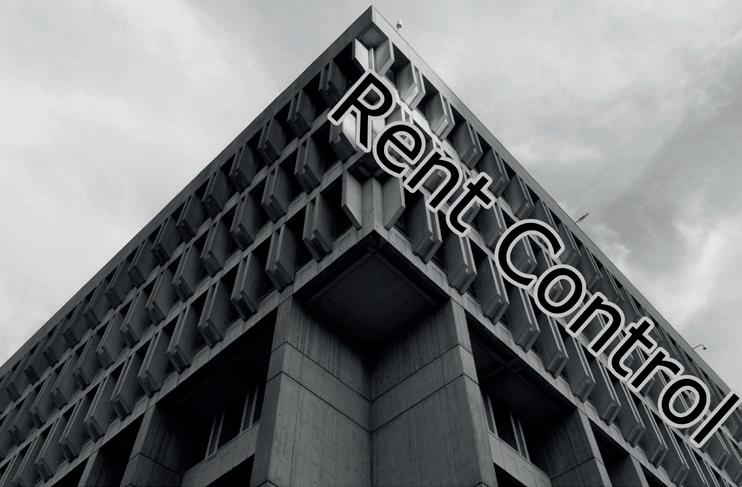
March 2023 22 MASSLANDLORDS NEWSLETTER MASSLANDLORDS IS FUNDED PRIMARILY
YOU FOR YOUR SUPPORT.
BY MEMBERSHIP DUES. THANK
Rent Control in Boston would take us back to the middle of the 20th century when towns subsidized this terrible policy. Derivative of Licensed Unsplash
these is its disparate impact on the basis of race. When landlords are hemmed in at or below inflation, with eviction restrictions, they hold units vacant longer waiting for a perfect applicant with high income and perfect credit. In America and in Boston no less, we have a BlackWhite wealth gap that previous housing policies have exacerbated. For this reason, the applicants who obtain rent controlled housing are disproportionately well-off, and as was seen in the ‘70s and ‘80s, unfairly, disproportionately white. I refer you to the work of David Sims 2007, who showed with data from Cambridge what Heikki Loikannen predicted in 1985. Rent control helps folks who have an apartment the second the law is enacted, but it hurts everyone else forever after.
If we were able to have a conversation about the housing crisis, I would want to direct your attention to the Metropolitan Area Planning Council’s zoning atlas. This resource shows zoning for many towns
on the basis of not just intended zoning, but actual limitations accounting for floor-area ratios, setbacks, and parking requirements. It shows half of Boston is zoned effectively single family. Zoning reform is the long-term solution. I mean density not just where Boston has already done more than its fair share, but density in neighboring communities through coordinated statewide action.
We know there are many households in your district unable to pay rent today, such that zoning reform is no immediate help. For these households, the rental assistance safety net must work. This is why MassLandlords is currently going into year two of litigation against the Department of Housing and Community Development over their having lost 47,000 of the 151,000 applications for pandemic rental assistance as of January 2022.
Long-term, we need zoning reform and a lot more housing. Short-term, we need rental assistance. But if today you wanted
a form of rent control to which landlords would not object, you could have it under Chapter 40P.
Sincerely,
Douglas Quattrochi Executive Director MassLandlords, Inc.
Point your camera app here to read more online.

March 2023 MASSLANDLORDS NEWSLETTER
ML
Do IRA Tax Incentives and Rebates Apply to Rental Properties?
By Eric Weld, MassLandlords, Inc.
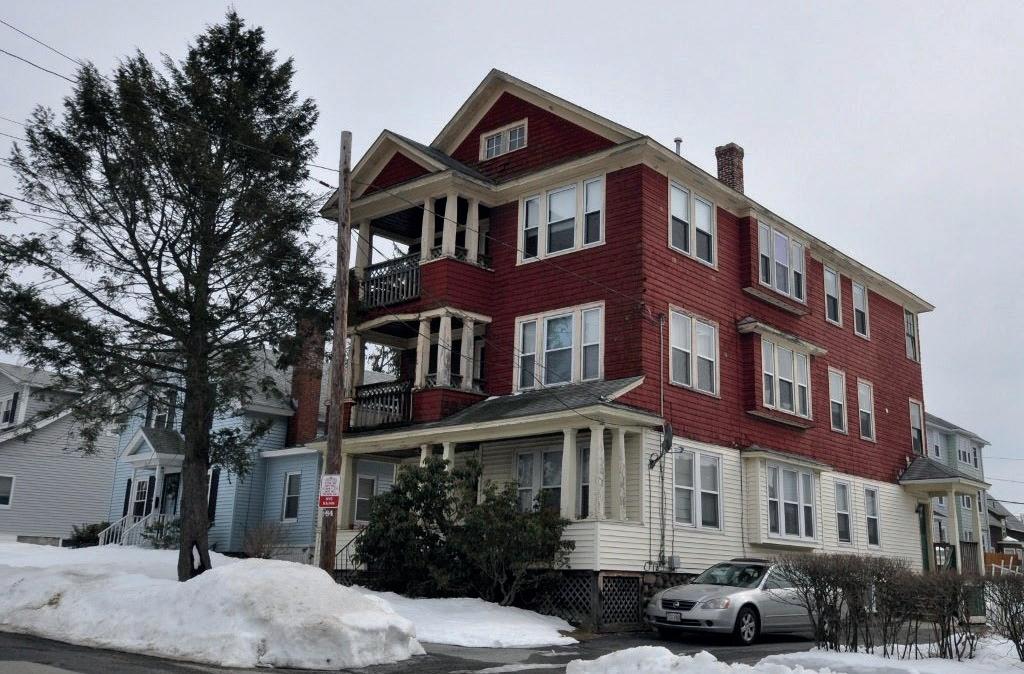
The short answer is: yes, the Inflation Reduction Act tax incentives and rebates for energy efficiency upgrades apply to rental properties. This means that landlords can benefit alongside principal residences and single-family homeowners. This is detailed in several sections of the law. In a nutshell, your renters must be in certain income
brackets, or your project must achieve certain energy savings, or both.
We quote heavily from IRA text below, for utmost accuracy. Read the entire text of the law here. (For quick reference, you could search for references to “multifamily” or “multifamilies.”)
Sec. 50121 (c), titled “Home Energy Performance-based, Whole-house Rebates,” outlines the HOMES rebate program (HOMES stands for Home Owner Managing Energy Savings). The HOMES program distributes federal funds to state programs to provide rebates for whole-house energy retrofits. Retrofits refer to upgrades to the home, including the purchase and installation of electric heat pump water heaters, electric heat pumps for space heating and
cooling, electric stoves, cooktops, ranges or ovens, electric heat pump clothes driers, electric load service centers, insulation, air sealing and ventilation improvement, and electric wiring.
REFERENCES TO MULTIFAMILIES
To be specific, Sec. 50121 paragraph (c)(2)(b) designates eligibility “for multifamily building owners and aggregators carrying out energy efficiency upgrades” at three levels: i) retrofits that achieve savings of between 20% and 35% are eligible for rebates of “$2,000 per dwelling unit, with a maximum of $200,000 per multifamily building”; ii) retrofits that achieve savings over 35%, “$4,000 per dwelling unit, with a maximum of $400,000 per multifamily building”; or iii) “for measured energy savings…a multifamily building or portfolio of multifamily buildings” achieving savings of at least 15% will be eligible for rebates that are measured per kilowatt hour saved.
The law continues to designate rebates for owners of multifamily buildings in which at least 50% of rental units are occupied by low- or moderate-income households (defined below). For retrofit energy savings of 20% to 35%, rebates equal the lesser of $4,000 per dwelling, or 80% of project cost. For retrofit energy savings of more than 35% in such buildings, rebates are set at $8,000 per unit or 80% of project cost, whichever is lower. For energy savings of at least 15% at multifamilies or a “portfolio of multifamilies,” rebate payments will be measured by kilowatt hour saved, or kilowatt hour-equivalent saved. This equals $2,000 for a 20% reduction of
March 2023 24 MASSLANDLORDS NEWSLETTER MASSLANDLORDS IS FUNDED PRIMARILY
BY MEMBERSHIP DUES. THANK YOU FOR YOUR SUPPORT.
Since the recent publication of our article on the Inflation Reduction Act, we’ve received questions about IRA benefits’ applicability to rental properites.
Inflation Reduction Act rebates, grants and tax incentives apply to owners of multifamily buildings as well as single-family homes. Depending on your renters’ incomes, some rebate and grant programs could cover 100% of project cost for energy saving upgrades. Image: CC BY-SA magicpiano.
energy use per unit for an average multifamily, or 50% of project cost.
The law defines low- or moderate-income households as “an individual or family the total annual income of which is less than 80% of the median income of the area” (AMI), as defined by HUD.
That percentage would cover many renters in Massachusetts. Consider Worcester, for one example. According to the most recent U.S. census for the city of Worcester, covering 2017 to 2021, AMI in the city was $56,746, with 80% equaling $45,396. In Boston, AMI for the same period was $81,744, with 80% AMI equaling $65,395.

FURTHER MULTIFAMILY PROVISIONS
Sec. 50122 of the IRA, “High-efficiency Electric Home Rebate Program,” also includes provisions for multifamilies, with more robust rebates available. This section appropriates more than $4.2 billion to be distributed to state energy offices and Native American tribes for the purpose of supporting or developing grant and rebate programs for energy upgrades.
Subsection (c)(4)(B) outlines rebate ranges for upgrades to appliances and energy systems: 50% of project cost “for a multifamily building not less than 50 percent of the residents of which are households the annual income of which is not less than 80 percent and not greater than 150 percent of the area median income”; and 100% of project cost “for a multifamily building not less than 50 percent of the residents of which are households the annual income of which is less than 80 percent of the area median income.”
To translate: using 2021 data, if your Worcester renters make between $45,000 and $85,000, you can complete energy upgrades in their units and receive a rebate for 50% of the cost of the project. If your Boston renters’ household income is less than $65,000, you could receive a rebate or grant fully covering the project cost.
Eventually, grants at point of purchase will also be available
IRA ALSO FOR MULTIFAMILIES
The IRA contains 18 references to multifamily buildings, carefully designating
their eligibility, alongside single-family homes, for program rebates, grants and tax incentives for energy upgrades. These IRA benefits for energy upgrades will remain effective through 2032. How they will be distributed among states, and which state programs will administer rebates and grants, is yet to be determined. (We will continue to monitor and report on progress and implementation of this law.)
But to be certain, the IRA did not exclude landlords and owners of multifamilies, and the next decade might be the optimal time to convert your rentals to electric heating and cooling, water heating, cooking and upgrading to new wiring. ML
Point your camera app here to read more online.
We Need Your Help to Advance Over a Dozen Pro-Housing Causes
Last summer we were delighted when our civil asset forfeiture bill passed the Senate by a vote of 31 to 9. For the first time since water submetering became law in 2004, landlords can improve the law! In January a new legislative session began. We’ve drafted 11 bills covering everything from court reform to DIY lawyering, plumbing and electrical. Several of these are filed and could become law before 2024.
25 March 2023 MASSLANDLORDS NEWSLETTER MASSLANDLORDS IS FUNDED PRIMARILY
YOUR
BY MEMBERSHIP DUES. THANK YOU FOR
SUPPORT.
ARTICLE YOU MAY HAVE MISSED
Point your camera app here to read more online.
$ 9 0 / H R
Schedule Calls With Our Sta for Business Advice and Legal Information For Just
helpline to your membership for a low annual fee and rest assured have one-on-one access to our counselors and attorney referrals for:
rights and responsibilities
Nonpayment of rent

Contractor disputes Termination of tenancies and eviction

Better Communities Better Policy Better Lives
? @
increases
REGIONAL
MassLandlords Upcoming events
2023 MARCH
2023 APRIL
March 2023
27 MaSSLaNDLOrDS IS FUNDED PrIMarILY BY MEMBErShIP DUES. ThaNK YOU FOr YOUr SUPPOrT. SUNDAY MONDAY TUESDAY WEDNESDAY THURSDAY FRIDAY SATURDAY 1 2 3 4 Mass Save Program 5:00pm - 6:40pm 5 6 7 8 9 10 11 SWLCA Virtual Meeting, NWCLA Cambridge Crash Course 7:00pm - 8:00pm 5:00pm - 6:40pm, 7:00pm-8:00pm 8:30am - 3:00pm 12 13 14 15 16 17 18 MWPOA State Sanitary Code 5:30pm-8:00pm 5:30pm - 8:30pm 19 20 21 22 23 24 25 Virtual Meeting Webinar 5:00pm - 6:40pm 12:00pm - 1:00pm 26 27 28 29 30 31 Virtual Meeting 5:00pm - 6:40pm SUNDAY MONDAY TUESDAY WEDNESDAY THURSDAY FRIDAY SATURDAY 1 2 3 4 5 6 7 8 SWLCA Virtual Meeting 7:00pm - 8:00pm 5:00pm - 6:40pm 9 10 11 12 13 14 15 MWPOA Virtual Meeting Virtual Meeting, NWCLA 5:30pm-8:00pm 5:00pm - 6:40pm 5:00pm - 6:40pm, 7:00pm-8:00pm 16 17 18 19 20 21 22 Virtual Meeting 5:00pm - 6:40pm 23 24 25 26 27 28 29 Virtual Meeting Webinar 5:00pm - 6:40pm 12:00pm - 1:00pm 30
See details under each region
Statewide Virtual Meeting: Mass Save Program: Huge Energy Rebates and Incentives
During this presentation we'll pull up the Mass Save website and walk through what's available. Attendees will learn:
• How to save substantially (sometimes 100%) on whole-building insulation.

• How heat pump water heaters are now eligible for rebates even if you replace gas.
• What options there are for heat pumps.
• And more!
If you work for CLEAResult or Mass Save and would like to add yourself as a co-presenter, just reach out! This will be a low-stress website tour without many PowerPoint slides.
Attendees will leave knowing how to take advantage of business-changing rebates and incentives for the benefit of your bottom line, your renters and our shared climate.
founding member of MassLandlords in 2013. He became the association's first Executive Director under new bylaws in 2014. Since then, he has scaled the organization from a core of 160 members in Worcester to approximately 2,500 dues paying businesses from Pittsfield to the Cape, and from an all-volunteer team to approximately 20 full and part-time staff plus 50 volunteers. Doug has been instrumental in advancing democratic governance mechanisms, including score voting for policy priorities and a staggered and democratically elected Board of Directors. Doug also oversees the RentHelper spin-off, which is expanding access to electronic banking for those of us who are unbanked or underbanked. Prior to MassLandlords, Doug held leadership roles in various Massachusetts startups, two of which are still operating. Doug holds a Master of Science in Aerospace Engineering from the Massachusetts Institute of Technology.

"Doug's presentation was excellent. He was very clear and provided detailed explanations." – Larry "Doug always holds very informative classes full of substance and Very organized!" – Thomas "Your answers to member's questions were most helpful." – Liz
Our host for networking time is yet to be announced.
Purchase your ticket in just a few clicks!
WEDNESDAY, MARCH 1ST
VIRTUAL MEETING AGENDA
5:00 pm Sign-in and virtual networking: you can chit chat with others as people log in
5:40 pm Presentation
6:40 pm Virtual Meeting ends
By member survey, the business update has been reimagined as a set of convenient videos viewable anytime online.
Participation is Easy
We have two formats of online events:
• Virtual meetings include optional audience participation via video, phone, and screenshare and, unless stated otherwise, are not recorded.
• Webinars have limited participation options (typed questions only) and, unless stated otherwise, are recorded. Our virtual registration desk is open for all events one hour starting 30 minutes prior to the event start time. Call 774-314-1896 or email hello@masslandlords.net for live, real-time help signing in and using your technology.
If joining a virtual meeting, please use the zoom "test audio" feature. You will be allowed to talk to others if your microphone is good and there is no background noise. We reserve the right to mute anyone for any reason. Attendees without a microphone or who don't want to be heard can type questions.
ACCESSIBILITY
Part of this presentation will be given by Doug Quattrochi, Executive Director, MassLandlords, Inc. Doug was a
"No Sales Pitch" Guarantee MassLandlords offers attendees of directly managed events a "No Sales Pitch" guarantee. If a guest speaker offers services, their presentation will not discuss pricing, promotions, or reasons why you should hire them. We do not permit speakers to pay for or sponsor events. Guest speakers are chosen for their expertise and willingness to present helpful educational content. Your purchase of an event ticket sustains our nonprofit model.
Automatic closed captions may be activated at any time. Simply turn on this setting from inside the Zoom app. Questions may be asked over microphone after using the "raise hand" feature of zoom. Questions may also be entered via the Zoom text chat box.
VIRTUAL MEETING DETAILS (HOSTED BY ZOOM)
We will share our video, audio, and computer screen and slides.
• Optional: You can share your video with everyone, talk to everyone, and type chat with everyone. Video sharing is not required. Talking is not required. Password will be emailed and viewable online
March 2023 28 MASSLANDLORDS IS FUNDED PRIMARILY BY MEMBERSHIP DUES. THANK YOU FOR YOUR SUPPORT. REGIONAL STATEWIDE
MassLandlords Executive Director Doug Quattrochi
Blow-in cellulose installed in this multifamily building reduced heating costs and emissions by 30% each. Mass Save paid for 90% of the cost.
03/01
WED
REGIONAL
Topic: Mass Save Virtual Meeting March 1, 2023
Time: Mar 1, 2023 05:00 PM Eastern Time (US and Canada)
Join Zoom Meeting
https://us02web.zoom.us/j/85637736571
Meeting ID: 856 3773 6571
Passcode: Will be emailed and viewable online
Dial by your location
+1 646 931 3860 US
+1 301 715 8592 US (Washington DC)
+1 305 224 1968 US
+1 309 205 3325 US
+1 312 626 6799 US (Chicago)
+1 646 876 9923 US (New York)
+1 408 638 0968 US (San Jose)
+1 507 473 4847 US
+1 564 217 2000 US
+1 669 444 9171 US
+1 669 900 6833 US (San Jose)
+1 689 278 1000 US
+1 719 359 4580 US
+1 253 205 0468 US
+1 253 215 8782 US (Tacoma)
+1 346 248 7799 US (Houston)
+1 360 209 5623 US
+1 386 347 5053 US
Meeting ID: 856 3773 6571
Passcode: Will be emailed and viewable online
Find your local number: https://us02web.zoom.us/u/kdOvp7iE12
PRICING
Open to the public. Membership is not required!
• Public: $21.00
• Members: $7.00
This event will not be recorded. Slides and handouts if any will be uploaded to MassLandlords.net/ resources/MassSave . Purchase your ticket in just a few clicks!
This event is operated by MassLandlords, Inc. staff.
This Virtual Meeting counts for continuing education credit for Certified Massachusetts Landlord Level Three. Beep in Leave feedback/beep out
Want to speak at a MassLandlords meeting? Submit a speaker request.
This is part of the Virtual rental real estate networking and training series. Google calendar users: add our event calendar to your own.
Google calendar users: add this event only to your calendar.
iPhone & iPad users: add our event calendar to iCal.
Outlook users: add our event calendar to Outlook.
Statewide Virtual Meeting: How to Screen Tenants Using an Applicant Qualifier
THU
This presentation will review our applicant qualifier in-depth. Best practice for screening tenants includes using an applicant qualifier. This objective point-scoring system ensures that your very expensive rental property will not be rented to the wrong tenant based on "gut feel". Also, this guarantees applicants equal housing opportunity without discrimination.
We will walk through each box, what documentation you should expect from an applicant, and what changes you may want to make to suit your business. Emphasis on:
• How to think about criminal records.
• How Section 8 should be scored.
• Is a credit score really worth so much?
• What matters most in a housing history.
• Why you should almost never listen to their current landlord.
• And much more!
Attendees will leave knowing how to rank applicants for rental housing, pick the best renter, and document your rental application decisions.
Example Applicant Qualifier for Tina Tenant
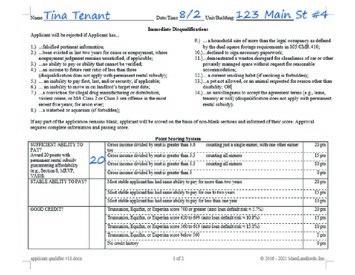
Part of this presentation will be given by Doug Quattrochi, Executive Director, MassLandlords, Inc. Doug was a founding member of MassLandlords in 2013. He became the association's first Executive Director under new bylaws in 2014. Since then, he has scaled the organization from a core of 160 members in Worcester to approximately 2,500 dues paying businesses from Pittsfield to the Cape, and from an all-volunteer team to approximately 20 full and part-time staff plus 50 volunteers. Doug has been instrumental in advancing democratic governance mechanisms, including score voting for policy priorities and a staggered and democratically elected Board of Directors. Doug also oversees the RentHelper spin-off, which is expanding access to electronic banking for those of us who are unbanked or underbanked. Prior to MassLandlords, Doug held leadership roles in various Massachusetts startups, two of which are still operating. Doug holds a Master of Science in Aerospace Engineering from the Massachusetts Institute of Technology.
"Doug's presentation was excellent. He was very clear and provided detailed explanations." – Larry

29 March 2023 MASSLANDLORDS IS
PRIMARILY
SUPPORT.
FUNDED
BY MEMBERSHIP DUES. THANK YOU FOR YOUR
MassLandlords Executive Director Doug Quattrochi
03/09
Networking time will be moderated by Dana Fogg. Dana started his rental business in 1994 with his first Multifamily in Watertown. Since then, Dana and his wife have purchased and sold rental properties around the Metro West area. They now have 9 Units in Watertown and Marlborough. Dana is the Vice President of the Metro West Property Owners Association. Purchase your ticket in just a few clicks!
"No Sales Pitch" Guarantee
MassLandlords offers attendees of directly managed events a "No Sales Pitch" guarantee. If a guest speaker offers services, their presentation will not discuss pricing, promotions, or reasons why you should hire them.
MassLandlords Thanks Our Property Rights Supporters
Property rights Supporters make monthly contributions earmarked for policy advocacy.

OWNERS COOPERATIVE
$100 and Up arrow Properties, Inc. allison Gray. haddad real Estate. hilltop Group holdings. rich Merlino. Premier choice realty. Spring Park Properties. Stony hill real Estate Services.
OWNERS CLUB
$50 to $99 Erin Zamarro, real Estate Broker. Foxworth Properties, LLc. Michael Goodman. harbor View realty Trust. hilltop realty. Brian Keaney. Mary Norcross. Jim O’Brien. PcPa LLc. Shamrock Management. Slope Properties LLc Bob Smith. Michael Totman. Union realty. Urban Lights LLc Winsser realty Trust. Witman Properties Inc.
WORKING TOGETHER CLUB
$20.25 to $49 557 Union avenue realty Trust. Yan alperin. Beacon hill Property Management. Broggi r.E. & Property Mgmt Inc. Linda caterino. chELSEacOrPLLc. Michael Donahue. James Duffy . Bob Finch. Lucille Fink. First chair Entertainment. Dana Fogg. royce Fuller. GMc Property Management LLc haverhill Multi-Family, LLc. Janice E Sawyer Family Trust. Jccarrig real Property. Karen Jarosiewicz. Matthew Maddaleni. Kristina Midura-rodriguez. Vincent Monaco. Jill Monahan. Darlene Musto. alex Narinsky. Liz O’connor. Olson apartments. Glenn Phillips. cheryl Popiak. Ted Poppitz. real Property Management associates. chris rodwill. South Shore apartments, Wembley LLc. The claremont Living LLc. Webber and Grinnell Insurance. Lorenzo Whitter.
We do not permit speakers to pay for or sponsor events. Guest speakers are chosen for their expertise and willingness to present helpful educational content. Your purchase of an event ticket sustains our nonprofit model.
THURSDAY, MARCH 9TH
VIRTUAL MEETING AGENDA
5:00 pm Sign-in and virtual networking: you can chit chat with others as people log in
5:40 pm Presentation
6:40 pm Virtual Meeting ends
By member survey, the business update has been reimagined as a set of convenient videos viewable anytime online.
Participation is Easy
We have two formats of online events:
WORKING TOGETHER CIRCLE
Up to $10 aaMD MGT. aFL Properties. ascorp Inc. Bernard Welch realty Inc. chris adler. Lori amara. rob Barrientos. ray Boylan. Broggi r.E. & Property Mgmt Inc. cc&L Properties, LLc corofin Properties. Demers Enterprises. Liz Dichiara. Dietschler Properties. Eastfield Family Trust. Dario Echeverria. Energywise homes, Inc. Deborah Entwistle. ann Eurkus. Margaret Forde. Forge Property Management. Erik Govoni. ross W. hackerson. hancock holdings LLc. Mike hempstead. JD Powers Property Management LLc. JMG realty & Investments. Gayle Joseph. catherine Jurczyk. Kee 55, Inc. agency account c/O Ercolini. Kubera Properties. John Kubilis. altagracia Lama. Jo Landers. Geri Ledoux. Brandon Lee. MassBay Group. Shane McGlone. anthony Membrino. ana Monte. Pavel Novikov. Mary Palazzo. PJM Property Management. alvan Pope. Tara Pottebaum. Property realty Group LLc. Douglas Quattrochi. real Property Management associates. Kathryn rivet. Lisa rizza. cary- amy rose. alexandra Schoolcraft. Michael Siciliano. Jonathan Siegel. John Siri. Joann Strub. Summit rentals LLc. TJB Properties. Tomaltach 0’Seanachain realty Trust. Topaz realty Trust. Vadim Tulchinsky. Snaedis Valsdottir. Mark Waitkevich. Stuart Warner. Westmass apartments LLc. Kim Wu. alexa Zaccagnino.
One-time and bespoke donations sincerely appreciated, too numerous to list here.
To join, complete a pink sheet at any MassLandlords event or sign up online at MassLandlords.net/property.
March 2023 30 MASSLANDLORDS IS FUNDED PRIMARILY BY MEMBERSHIP DUES. THANK YOU FOR YOUR SUPPORT.
REGIONAL
"Doug always holds very informative classes full of substance and Very organized!" – Thomas
"Your answers to member's questions were most helpful." – Liz
Dana Fogg will moderate networking time. You can volunteer for a future event.
• Virtual meetings include optional audience participation via video, phone, and screenshare and, unless stated otherwise, are not recorded.
• Webinars have limited participation options (typed questions only) and, unless stated otherwise, are recorded.
Our virtual registration desk is open for all events one hour starting 30 minutes prior to the event start time. Call 774-314-1896 or email hello@masslandlords.net for live, real-time help signing in and using your technology.
If joining a virtual meeting, please use the zoom "test audio" feature. You will be allowed to talk to others if your microphone is good and there is no background noise. We reserve the right to mute anyone for any reason. Attendees without a microphone or who don't want to be heard can type questions.
ACCESSIBILITY
Automatic closed captions may be activated at any time. Simply turn on this setting from inside the Zoom app. Questions may be asked over microphone after using the "raise hand" feature of zoom. Questions may also be entered via the Zoom text chat box.
VIRTUAL MEETING DETAILS (HOSTED BY ZOOM)
We will share our video, audio, and computer screen and slides.
• Optional: You can share your video with everyone, talk to everyone, and type chat with everyone. Video sharing is not required. Talking is not required. Password will be emailed and viewable online.
Topic: Applicant Qualifier Virtual Meeting March 9, 2023
Time: Mar 9, 2023 05:00 PM Eastern Time (US and Canada)
Join Zoom Meeting
https://us02web.zoom.us/j/89357621985
Meeting ID: 893 5762 1985
Passcode: Will be emailed and viewable online
+1
Dial by your location
+1 312 626 6799 US (Chicago)
Meeting ID: 893 5762 1985
Passcode: Will be emailed and viewable online
Find your local number: https://us02web.zoom.us/u/k9lSz5ney
PRICING
This event is closed to the public. Membership is required.
• Members: $7.00
This event will not be recorded. Slides and handouts if any will be uploaded to Applicant Qualifier .
Purchase your ticket in just a few clicks!
This event is operated by MassLandlords, Inc. staff.
This Virtual Meeting counts for continuing education credit for Certified Massachusetts Landlord Level Three. Beep in Leave feedback/beep out Want to speak at a MassLandlords meeting? Submit a speaker request.
This is part of the Virtual rental real estate networking and training series. Google calendar users: add our event calendar to your own.
iPhone & iPad users: add our event calendar to iCal.
Outlook users: add our event calendar to Outlook.
Fitchburg: Service and Emotional Support Animals
03/09
Join us for our monthly meeting, Service and Emotional Support AnimalsJoin us for our monthly meeting, this month we will hear from the Massachusetts Commission Against Discrimination (MCAD), presenting on the differences between service, companion and emotional support animals. Learn the legal rights of tenants and the crucial information to help us ensure they are not being discriminated against; intentionally or not.
Meetings are open to the public! This meeting will NOT be available on Zoom. First-time in-person visitors can attend for $20 per person to "check us out," with dinner included. If they decide to join, the $20 will be applied to an NWCLA membership, or sponsorship of choice, that night. Become a member and the annual dues pay for all 10 meetings a year!
THURSDAY, MARCH 9TH
NWCLA MEETING AGENDA
Visit nwcla.com for any last-minute updates or changes.
7:00pm Dinner, Networking & Presentations
o Networking draws from 25 towns including Fitchburg, Gardner, Leominster, Athol, Holden, Ayer, Orange, Ashburnham, Spencer, Ashby, Lunenburg, Townsend, Westminster, Princeton, Sterling, Lancaster, Shirley, Groton, Pepperell, Winchedon, Templeton, and Hubbardston.
IN PERSON LOCATION
British American Club
1 Simonds Road
Fitchburg, MA 01420
FOOD
• Dinner will be provided.
PRICING
Open to NWCLA Members Only
31 March 2023 MASSLANDLORDS
IS FUNDED PRIMARILY BY MEMBERSHIP DUES. THANK YOU FOR YOUR SUPPORT. REGIONAL
646
646 931 3860
301 715 8592
DC) +1 305 224 1968 US +1 309 205 3325 US +1 360 209 5623 US +1 386 347 5053 US +1 408 638 0968 US (San Jose) +1 507 473 4847 US +1 564 217 2000 US +1 669 444 9171 US +1 669 900 6833 US (San Jose) +1 689 278 1000 US +1 719 359 4580 US +1 253 205 0468 US +1 253 215 8782 US (Tacoma) +1 346 248 7799 US (Houston)
876 9923 US (New York) +1
US +1
US (Washington
NORTHERN WORCESTER COUNTY
THU
REGIONAL
NWCLA Membership not required! Open to the public.
• In person ticket – Public and MassLandlords Members other than NWCLA: $20
• MassLandlords.net/NWCLA members: pay annual NWCLA dues, then free This event is operated by volunteers.
METROWEST
SOUTHERN WORCESTER COUNTY
Southbridge: Set up Your Investment Property to Protect Yourself and Maximize Investments
SWCLA speaker for the March 6th meeting will be Dennis Antonopoulos, Financial Advisor, Edward Jones, since 2014.
His office is located in Auburn at 5 Albert Street. You can reach him at 508 832 5385 or at dennis.antonopoulos@ edwardjones.com
Dennis specializes in working with individuals and small companies. He has been a landlord for over 20 years, so he knows the process, the risks and the rewards. He still owns a 2 family in R.I. Dennis will talk to us about how important it is for landlords to understand how to set up their investment property to protect themselves and maximize their investments. Dennis also serves on the Board of Directors for the Auburn Chamber of Commerce.
MONDAY, MARCH 6TH
SWCLA MEETING AGENDA
7:00pm Douglas Quattrochi, Executive Director, MassLandlords, Inc.
o Update on MassLandords activities
7:15pm Presentations
IN PERSON LOCATION
Southbridge Community Center (aka Casaubon Senior Center)
153 Chestnut St. Southbridge, MA 01550
ZOOM DETAILS
Zoom meeting information will be emailed to SWCLA members on the
day of the event and viewable online for SWCLA Members Only.
PRICING
Open to SWCLA Members only. Pay annual SWCLA dues then free. All SWCLA members whose dues are up to date will be sent a link to the meeting via email.
• SWCLA Members, pay dues for the year are admitted for free
• General public, in person meeting is free the first time, then pay $50/yr for membership.
This event is operated by volunteers.
BERKSHIRE COUNTY
CENTRAL WORCESTER COUNTY
Wanted for Guarantee: Worcester Studios and One Bedrooms
The City of Worcester has signed an agreement to pilot a landlord-tenant guarantee fund, under which you may be eligible to receive $10,000 of coverage for unpaid rent, property damage, and attorney's fees if you rent to one of our renters instead of a market renter.
The guarantees are being issued to Worcester landlords who choose to rent to residents currently experiencing homeless in the city. All of our residents have been awarded permanent subsidies (MRVP, VASH, or Section 8) so they can pay the rent. All of our residents also receive supportive services, so they get help with whatever caused them to experience homelessness in the first place. These residents are all individuals, so we are looking for studios or one-bedrooms near bus routes.
You will still be able to screen your renter as normal. You will have to waive screening criteria that would adversely affect an applicant with non-violent criminal history, bad credit, and/or an eviction record. All other screens can be conducted as normal (ability to pay rent, move-in monies, smoking, pets, etc.).
You will get unlimited helpline access if you participate. We can issue these guarantees because we know in over
80% of cases, you won't lose a dime, and we won't have to pay the guarantee. For no-obligation information, call the helpline at 774-314-1896 or email hello@masslandlords.net

CHARLES RIVER (GREATER WALTHAM) BOSTON, CAMBRIDGE AND SOMERVILLE
Cambridge: The MassLandlords Crash Course in Landlording
Learn everything you need to succeed as an owner or manager of residential rental property in Massachusetts.
This fast-paced course is strictly limited to 16 participants to allow for detailed discussion and Q&A. Course tuition includes:
• Small group session with the Executive Director, a trained presenter and experienced landlord, and the attorney.
• A comprehensive agenda, see below.
• Your choice of two books:
o Every Landlord's Tax Deduction Guide by NOLO,
o The Good Landlord by Peter Shapiro,
o Getting to Yes by Roger Fisher, and/or
o The Housing Manual by H. John Fisher.
• A bound summary of all material presented.
• Breakfast pastries, coffee, tea.
• Lunch sandwiches, sodas, chips, cookies; all dietary requirements satisfied, please notify us when you purchase a ticket.
• A MassLandlords ballpoint pen.
• A MassLandlords certificate of completion and permission to use "MassLandlords Crash Course graduate" on your marketing material.
March 2023 32 MASSLANDLORDS IS FUNDED PRIMARILY BY
DUES.
YOU FOR YOUR SUPPORT.
MEMBERSHIP
THANK
MON 03/06 MON 03/06 SAT 03/11
You will receive a box packed with your personalized signed certificate, your choice of two books, course notes, pen, and half a dozen other pieces of literature.
Purchase your ticket in just a few clicks!
REGIONAL
o Lead paint (Legal highlight)
o Utilities
o Bones vs surfaces
o Amenities
o Repairs and renovations
o Durable vs beautiful
o What if I'm stuck with what I've got?
9:40am – Sales and marketing 101 for rental property managers

o Marketing rentals
o Sales process
o Staying organized
o Branding a small business
o Getting more or fewer calls
o Tips and tricks
10:05am – Break for ten minutes
10:15am – Finish sales and marketing
10:35am – Applications and screening
o Criminal, credit, eviction
o Discrimination (legal highlight)
o Tenant Screening Workshop
11:30am – Rental Forms
o Lease vs Tenancy at Will
o iCORI
o Eviction notices
11:50am – Break and Lunch, with free form Q&A
12:20pm – Finish rental forms
o Lease violations and conflict resolution
o Record keeping
2:40pm – Overview of books and resources for further education
2:45pm – Review of unanswered questions
3:00pm – End Course
Please note that end time each day may vary based on questions.
LOCATION
Cambridge Innovation Center
14th Floor, Charles Conference Room
One Broadway
Cambridge, MA 02134
Please note: CIC has several buildings in Kendall Square, two of them being adjacent to each other. The correct location for this event is the building with light colored concrete, vertical windows and a Dunkin Donuts on the ground level. You will NOT see a CIC sign. Refer to the image below.
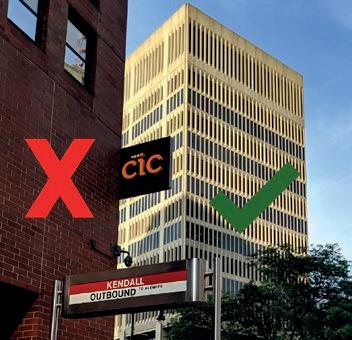
Featured Testimonial
“I simply wanted to reach out and express just how happy I am to have attended the landlording crash course. The presentation and delivery of the information was flawless and I certainly have walked away with a greater understanding of the intricacies that govern being an above average landlord/manager.”

SATURDAY, MARCH 11TH, 2023
CRASH COURSE AGENDA
Saturday, March 11th, 2023
8:30am – Introduction of MassLandlords and course participants
8:45am – Rental markets
o Urban, suburban, rural
o Luxury, college, professional, working, subsidized, rooming houses
9:00am – Property selection
12:40pm – Legal Matters start
o Late fees
o Security deposits
o Eviction process
o Move-and-store
o Water and electrical submetering
o Housing Court vs District Court

o Warranty of habitability
o Inspections
o Subsidies
o Rent control
1:40pm – Break for ten minutes
1:50pm – Maintenance, hiring, and operations
o Keeping the rent roll and expenses
o Filing taxes
o To manage or not to mange
o Tenants as customers
o Notifying tenants
o Extermination
o Monitoring contractors
ACCESSING FROM THE T
• Exit the Kendall T stop on Main St.
• Cross to the side of Main St. with the Chipotle and walk up the street towards Broadway, passing the Chipotle on your left.
• You will then round the corner to the left and One Broadway will be across the street diagonally.
• Cross over Third St. and Broadway to arrive at One Broadway.
For all attendees Upon entering One Broadway, you will need to check in with the lobby security. You'll just need to show your ID and let them know you're going to the MassLandlords event and which floor.
33 March 2023 MASSLANDLORDS IS
PRIMARILY
YOUR SUPPORT.
FUNDED
BY MEMBERSHIP DUES. THANK YOU FOR
Instructor Douglas Quattrochi
Instructor Attorney Adam Sherwin
–
Michael Murray
PARKING
Accessible by T and highway. Parking available in several garages for weekend rates. See CIC Directions for details. Pilgrim Parking has affordable rates and is a short walk from the venue, click here for details
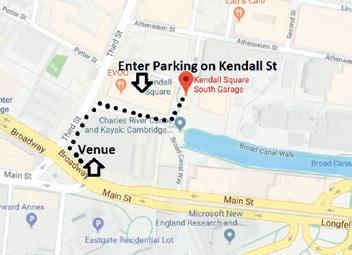
REGIONAL
• Lunch:
o Assorted gourmet sandwiches
o Garden salad
o Pasta salad
o Assorted pastries
o Soda, juice, water
*Please email hello@masslandlords.net if you have any dietary restrictions and need a special meal. This event will not be recorded.
PRICING
Open to the public. Membership is not required, but advance registration is required!
• Online:
This event is in-person only. There is no zoom option. Look for our next crash course over zoom or locally.
FOOD
• Breakfast:
o Fresh bagels, large muffins, cinnamon rolls, coffee cake slices and scones with cream cheese, butter, and jam
o Fresh fruit platter
o Assorted fruit juices and coffee
o Non-members: $250
o Members: $225 (log in before you register or you will see the non-member price)
• Online registration required. All ticket sales final.
PUBLIC HEALTH
At time of advertising, masks were not required by any policy of MassLandlords, the venue or the municipality. Masks are welcome. Breakfast and lunch will be served in or
near the room and may be taken outside weather permitting.
If you are feeling tired or sick, please do not come! Your ticket will be refunded in full. Please let us know before the start time for your course so we can notify the instructors.
Click here to purchase tickets for this event
The training counts for continuing education credit for Certified Massachusetts Landlord Level Three. Beep in Leave feedback/beep out
This event is operated by MassLandlords staff.
Membership
This is part of the Virtual rental real estate networking and training series.
Google calendar users: add our event calendar to your own.
Google calendar users: add this event only to your calendar.
iPhone & iPad users: add our event calendar to iCal.
Outlook users: add our event calendar to Outlook.
March 2023 34 MASSLANDLORDS IS FUNDED PRIMARILY
YOUR
BY MEMBERSHIP DUES. THANK YOU FOR
SUPPORT.

MassLandlords
One Broadway, Floor 14
cambridge, Ma 02142
SUBSCRIBE TODAY

Perfect to share at the office. Members can add print delivery for an additional $90 per year. Become a member and subscribe online at masslandlords.net/join.
Support better housing policy and housing journalism in Massachusetts.
March 2023 36 MASSLANDLORDS NEWSLETTER MASSLANDLORDS IS FUNDED PRIMARILY BY MEMBERSHIP DUES. THANK YOU FOR YOUR SUPPORT.
State Sanitary Code Changes Next Month
The state sanitary code defines what every apartment in Massachusetts must do and be. Unlike the building code, which is usually inspected only at time of permit completion, the state sanitary code applies in all rentals all the time, and can be inspected at any time. Did you know it will be changed in half a dozen major ways starting April 1?
Few units are fully compliant as-is. We’ll review the new code in easy-tounderstand detail and help you get a sense of where you may need to make repairs or improvements.
The state sanitary code is your biggest liability in a nonpayment situation, where a renter is being taken to court. They will be able to counterclaim based on the condition of the apartment. If you anticipate having any kind of conflict resolution process with a renter, it’s critical that your apartment is fully up to code and your position is one of blamelessness.
“This is my second time participating in the sanitary code session, and I still learned something new that we need to address in our building.” –Beatrice
“Presentation was VERY informative and thorough.” -Carol
This presentation will be given in parts by:
Doug Quattrochi, Executive Director, MassLandlords, Inc.
Keith O’Connor, Deputy Director of Housing Code Enforcement for the City of Springfield
Amber Gold, 2nd Associate City Solicitor for the City of Springfield
Thursday, March 16th Dinner Meeting Agenda
5:30 pm Sign-in and networking. Mix and mingle but don’t be shy! Introduce yourself to someone and you might make a valuable local connection.
Networking draws from Springfield, West Springfield, Holyoke, Chicopee, Ludlow, Wilbraham, East Longmeadow, Longmeadow, Agawam, Southwick, Southampton, Easthampton, Northampton, Westhampton, Hadley, South Hadley, Granby, Amherst, Belchertown, Ware, Palmer, Warren, Monson, and Hampden.
6:10 pm Dinner
6:40 pm Introductions and short business updates
6:50 pm Presentation
7:50 pm Presentation ends
8:30 pm Doors close
BACK FOR THE FIRST TIME IN THREE YEARS!
Location
Twin Hills Country Club
700 Wolf Swamp Rd
Longmeadow, MA 01106
Food
Twin Hills always sets out an impressive spread: Cheese and crackers for networking time.
Hot buffet dinner with choice of chicken, fish or vegetarian. Salad and rolls. Cash bar.
Whisky bread pudding. Hot coffee and tea.
*Dietary restrictions: Purchase a ticket and set your preferences at My Account one week prior to the event or earlier. Once set, preferences remain set for future events.
*Masks welcome! Eating and drinking is not required. Please note: as we are unable to monitor the buffet, we are unable to offer a reduced ticket price for attendees who will not be eating.
Pricing
Open to the public. Membership is not required!
Door:
Public: $92.00
Members: $77.00

Early-bird, reserve seven days prior by 12pm:
Public: $82.00
Members: $67.00
Longmeadow Dinner Meeting • Thu Mar 16th Point your camera app here to read more online & save your seat!




























 By Kimberly rau, MassLandlords, Inc.
By Kimberly rau, MassLandlords, Inc.


























